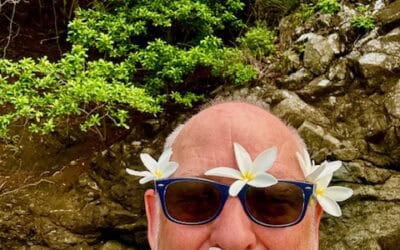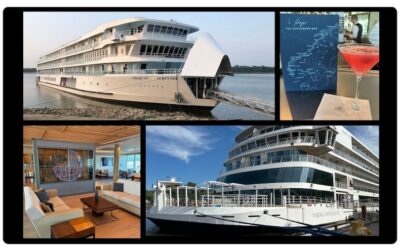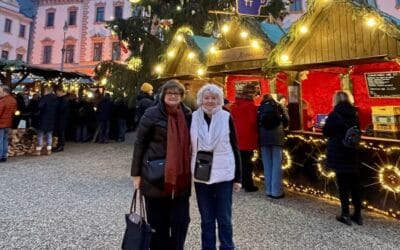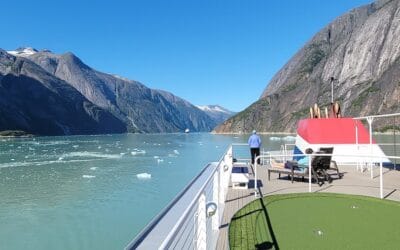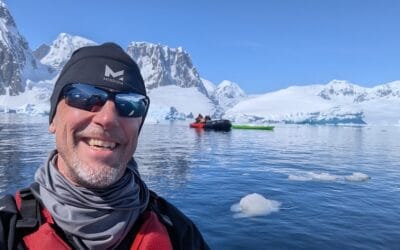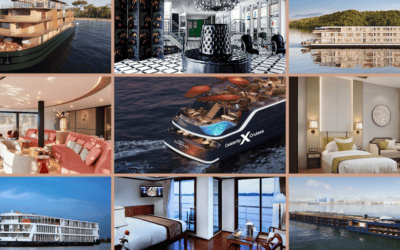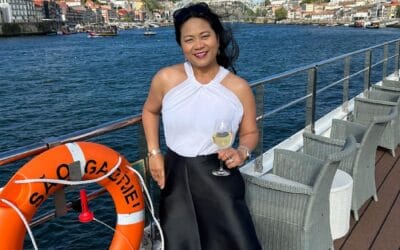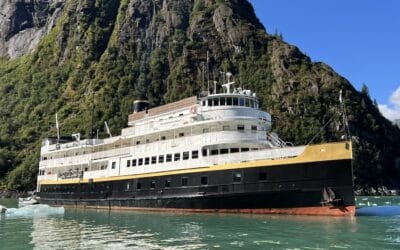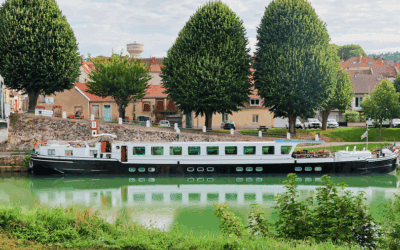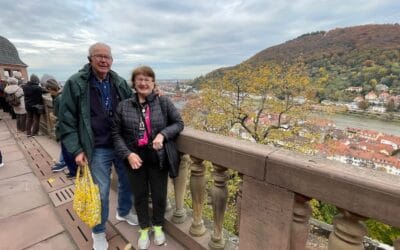Champa Pandaw on the Upper Mekong
By Judi Cohen @TravelingJudi
Nearly a decade ago, my husband and I discovered Pandaw Cruises. Over the past 10 years we've traveled throughout Southeast Asia on their small river boats in Burma, Thailand, Cambodia, and Vietnam.
While service ceased during the COVID pandemic, we were thrilled to finally return for a small-ship Upper Mekong cruise in Laos in December 2022. If you’re curious about this type of cruising or looking for your next adventure, I hope you’ll be inspired to visit this tiny country and learn about its history and vibrant culture.
Over 10 nights, we cruised 736 nautical miles on the RV Champa Pandaw upstream on the Mekong River from Vientiane to Chiang Khong, just across the river in Thailand.
The Mekong River snakes its way down from Tibet through China, Burma, Laos, Thailand, Cambodia, and Vietnam.
Our Laotian captain knew every inch of the river and used the twin 600HP engines to power through whirlpools and navigate the narrow locks in the recently constructed hydro-electric dam.
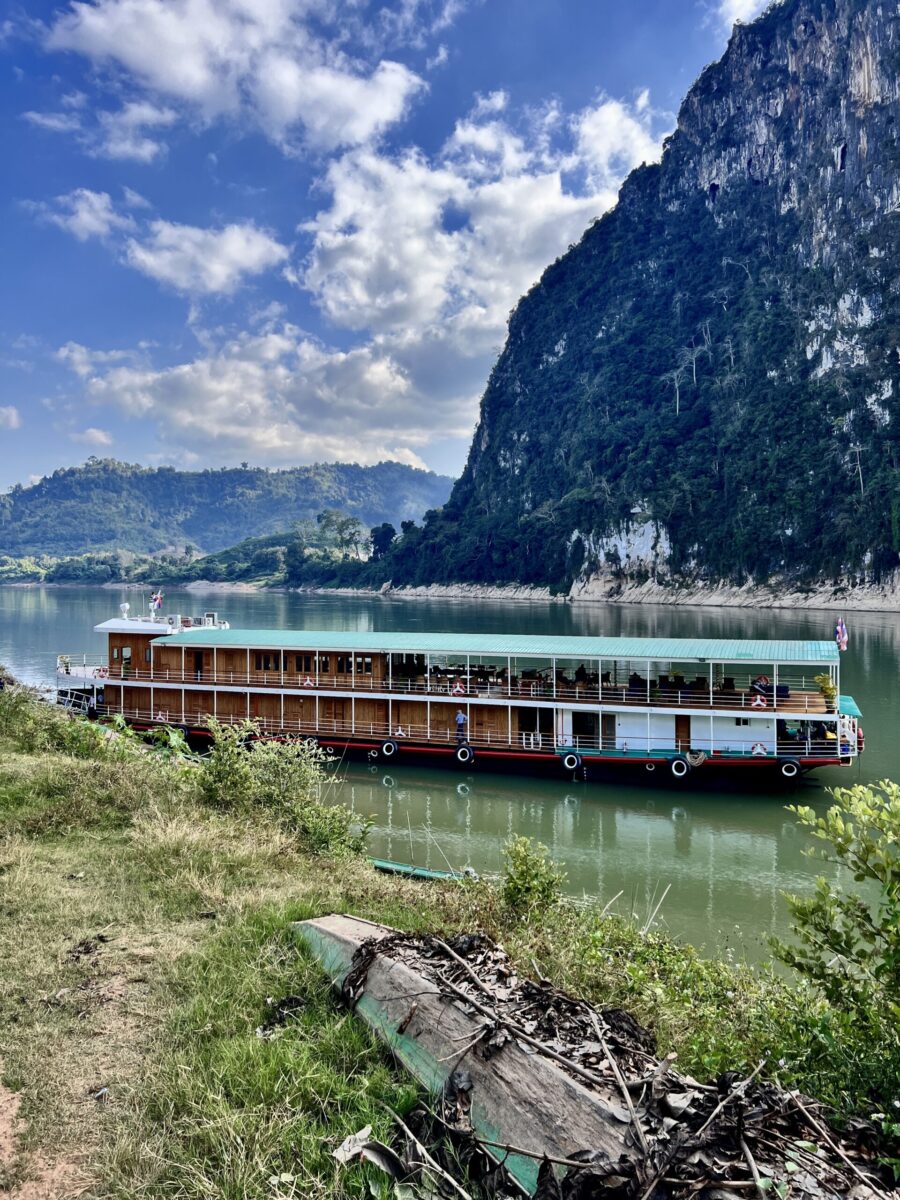
Champa Pandaw on the Mekong in Paleap, Laos. * Photo: Judi Cohen
The scenery changed as we cruised north, with the lowest water level at the start, and the Mekong becoming narrower and curvier with dramatic cliffs and mountains and multiple shades of green as we made our way upstream.
Cruising on the Upper Mekong River is slow and quiet, providing ample opportunities to learn about the people living near the riverbanks.
Our guide was from Laos and was with us for the entire cruise, providing onboard education coupled with immersive excursions along the itinerary.
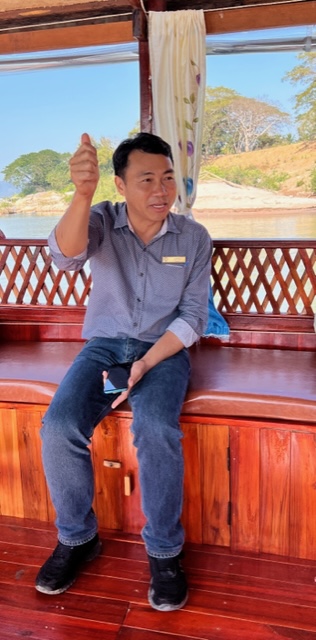
The Laotian guide Vieng was onboard for the week. * Photo: Judi Cohen
Subscribe to our monthly small ship cruise email
Subscribe to QuirkyCruise.com for monthly curated newsletters highlighting our top small cruise ship reviews, round-ups & offers!
The Boat — The 28-pax Champa Pandaw
The Champa Pandaw is a charming small ship, constructed in the style of the 19th-century Irrawaddy Flotilla which owned the largest fleet of river boats in the world. It is almost identical to the other Pandaw ships we have cruised on.
With a capacity of 28 passengers in 14 identical 150 sq ft cabins (12 on the main deck and 2 on the upper deck), the light-colored teak wood, grown in the jungles along the Mekong River, blended perfectly with the surrounding scenery.
One staircase in the middle of the boat connected the two decks. We spent most of the time on the upper deck with the saloon, bar, outside dining area, and sun deck.
The bow, forward of the main deck cabins, was where we left the ship for excursions. Shoes were left at the bow and cleaned by the crew each time we returned to the boat.
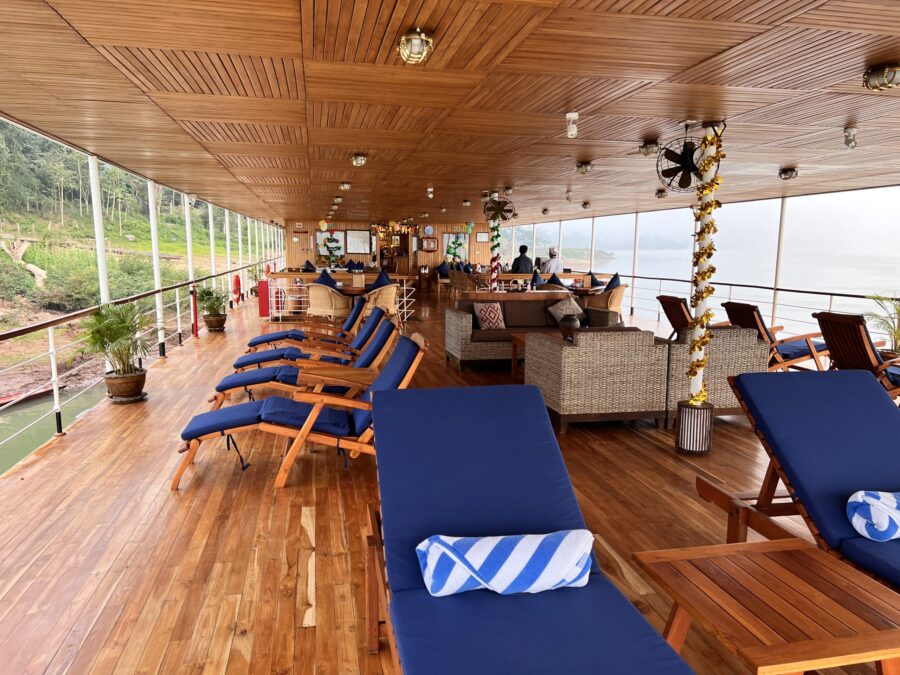
Upper Deck of Champa Pandaw. * Photo: Judi Cohen
Our Cabin on Champa Pandaw
Our 150-sq-ft cabin was on the main deck near the bow. It had a private bathroom complete with shower, sink, toiletries, and a hair dryer. Furnishings included a small teak desk, two beds, (configured as one king bed at our request), a small closet with a safe, and plenty of space for suitcases and clothing in under-bed storage drawers.
We were happy to be closer to the bow, so we didn’t feel the engine rumble or smell any exhaust, as you would if your cabin was aft.
Double sliding doors, one with teak shutters and the other with glass, can be locked for sleeping and when leaving the boat for excursions.
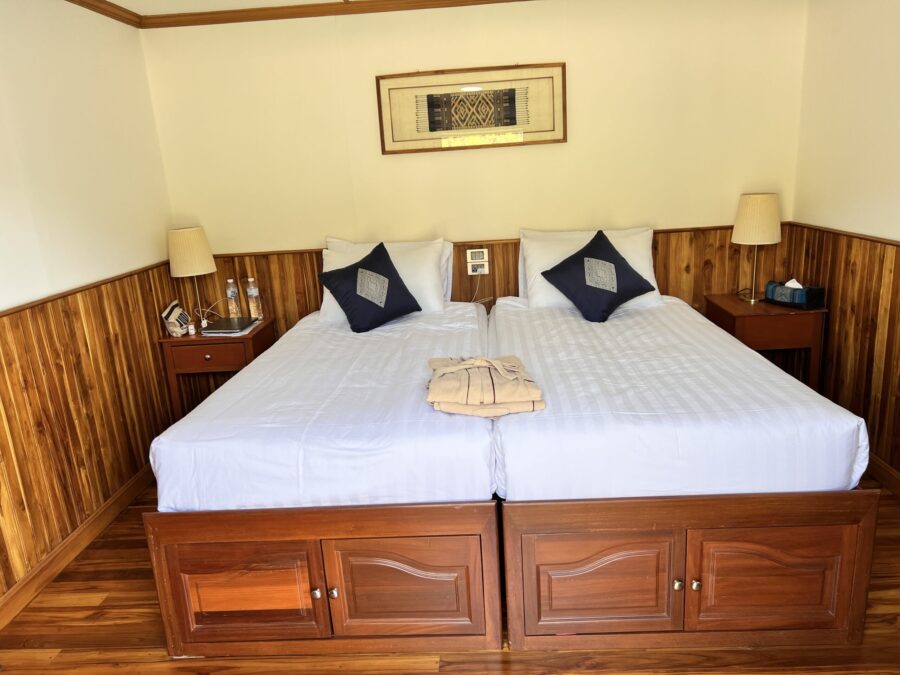
Our Cabin. #103. * Photo: Judi Cohen
VIDEO: Judi shows us around her cabin, #103, below.
International Passengers Aboard Our Champa Pandaw Cruise
There were 23 passengers on our sailing from Thailand, Australia, South Africa, Switzerland, Spain, Germany, Belgium, Canada, and the United States.
More than one third of the passengers were traveling solo.
Ranging in age from 45 to almost 80, most passengers seemed well-travelled, fit, and interested in learning about Laos. Mingling in the lounge and enjoying meals at two long tables, we all got to know each other quite well.
Two couples opted for private dining at their own table.
Daily Routine Aboard Champa Pandaw
A daily program was delivered to our cabin every evening. I learned that “game time” changes were made frequently depending on the weather and water.
Coffee and snacks were available for early risers followed by breakfast from 7-9am.
A morning excursion was followed by lunch at 12:30pm. At around 3pm we left for an afternoon excursion.
Complimentary cocktails were offered in the lounge at 6pm. Before dinner at 7pm, the purser and guide briefed us on the day ahead.
Almost everyone stayed in the lounge after dinner to relax and talk to each other. On some evenings there was live cultural entertainment including dancing and drumming in colorful traditional costumes and wooden painted masks.
Local Dishes Served on Champa Pandaw
The fresh, local food aboard Champa Pandaw was exceptional.
We enjoyed authentic Southeast Asian meals, prepared by Thai chefs. International choices were available as well.
Breakfast was a combination of buffet and menu items including eggs that could be ordered any style. The buffet included fresh local fruits including dragon fruit, melons, papaya, mango and jack fruit, fresh juices and smoothies, pho (a broth with noodles, vegetables, and lemongrass), yoghurt, pastries, cereals, and porridge.
Each morning we were asked to choose our main courses for lunch and dinner from a printed menu. It was difficult to choose from among the delicious options.
Lunch included a salad bar, cheeses, meats, nuts, and a daily soup. The main courses we ordered earlier in the day (pasta, fish, chicken, or a noodle dish) were then served and included a dessert choice.
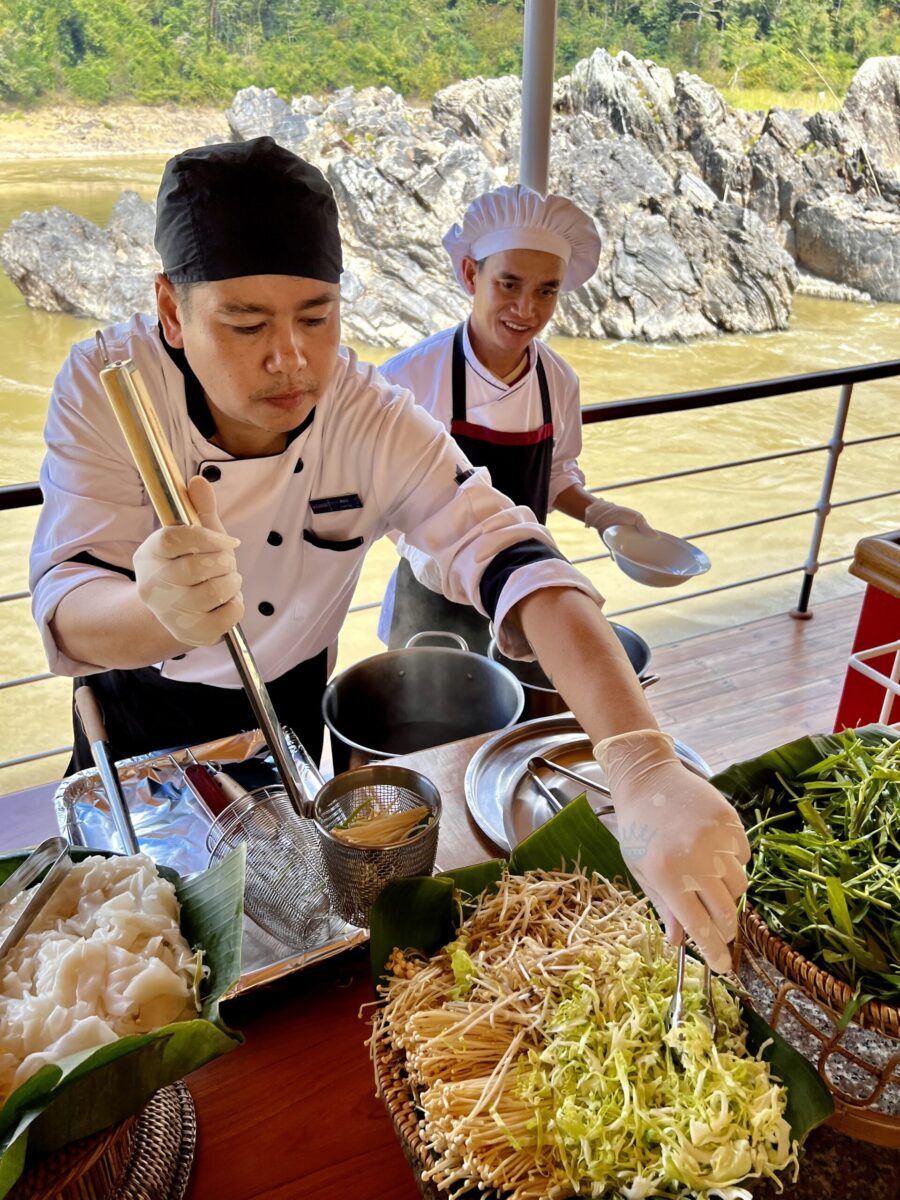
Preparing all the ingredients for lunch pho buffet. * Photo: Judi Cohen
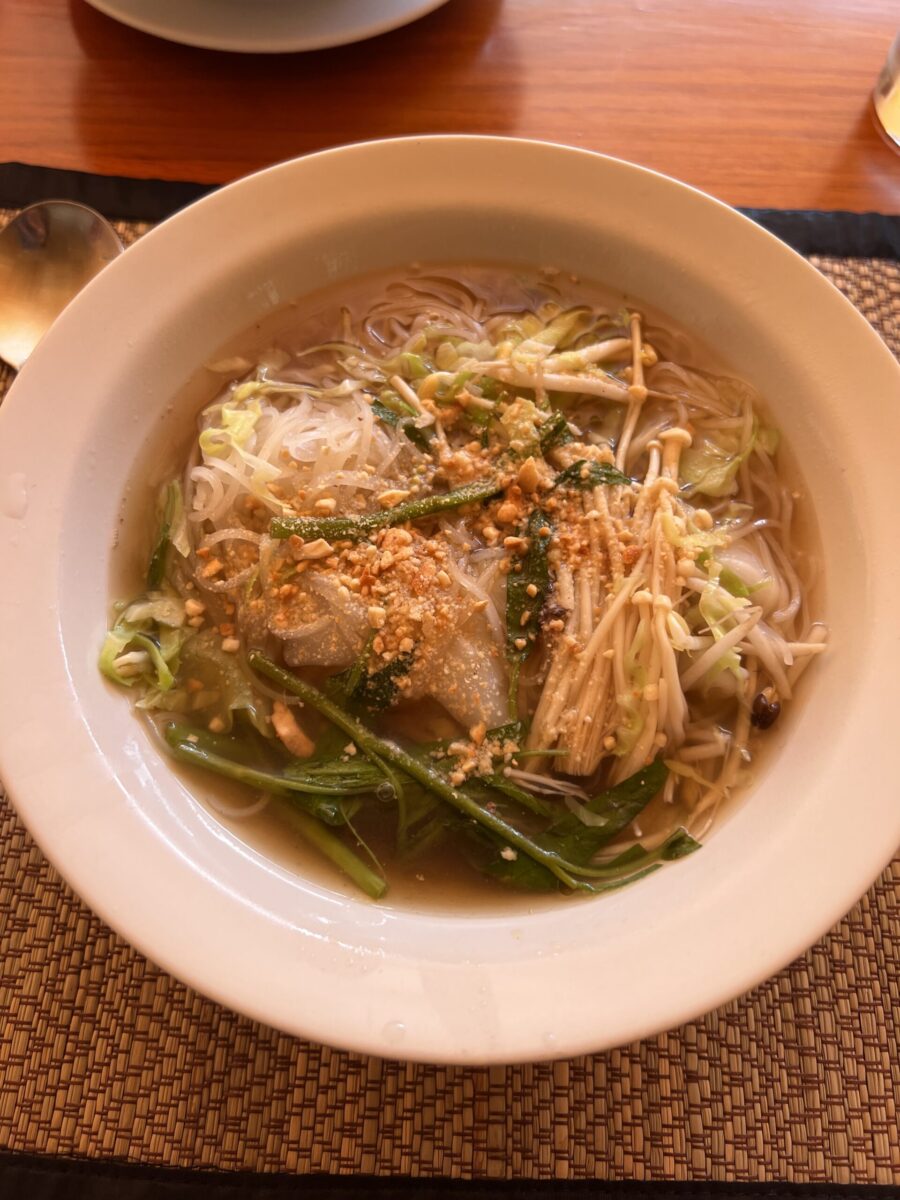
Healthy Pho Bowl with fresh vegetables. * Photo: Judi Cohen
Dinner included soups, salads, and a main course.
Just as we experienced on our previous Pandaw cruises, the food was fresh and exceptional. Passengers who had specific allergies and preferences were accommodated graciously.
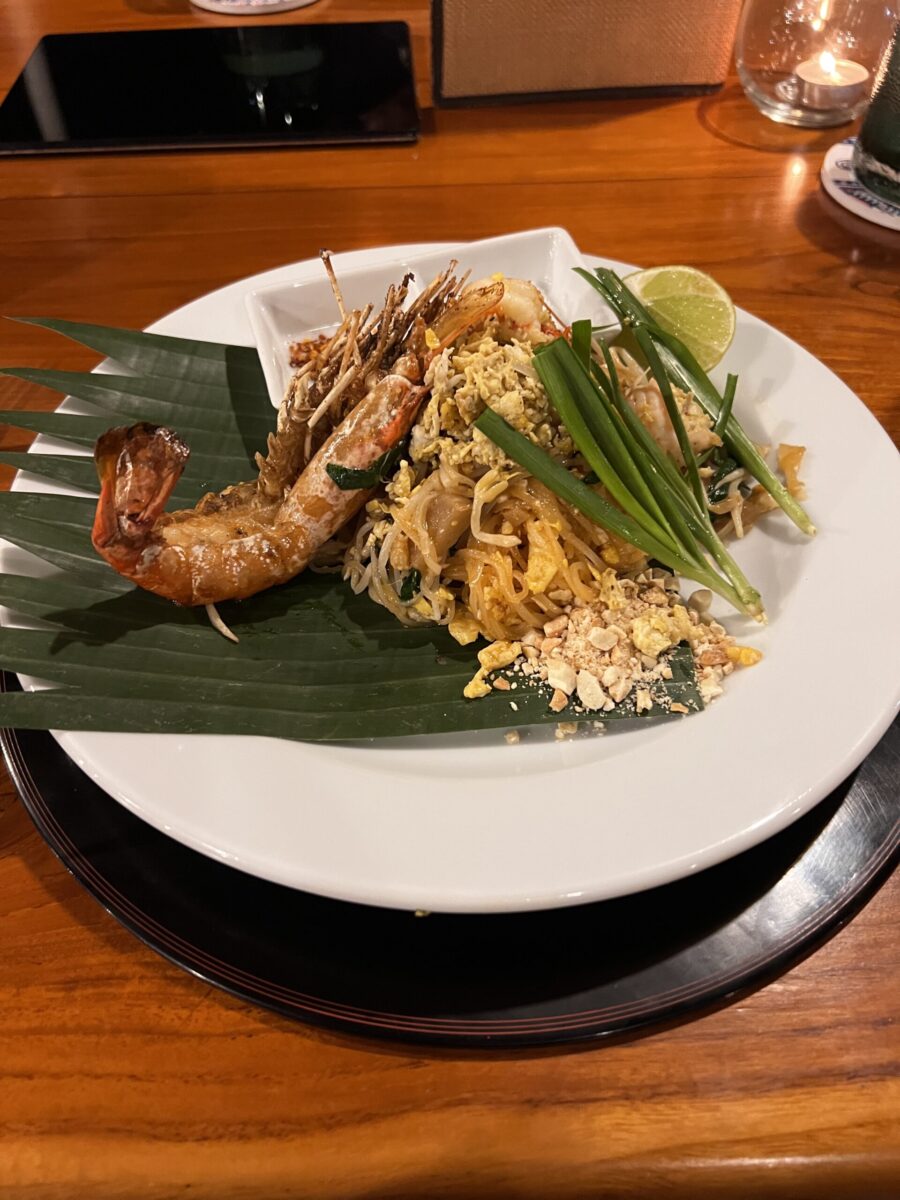
Pad Thai with prawns. * Photo: Judi Cohen
A drinks package was available for purchase, or drinks could be purchased a la carte.
At the evening briefings, a daily cocktail was complimentary in the saloon along with hors d’euvres.
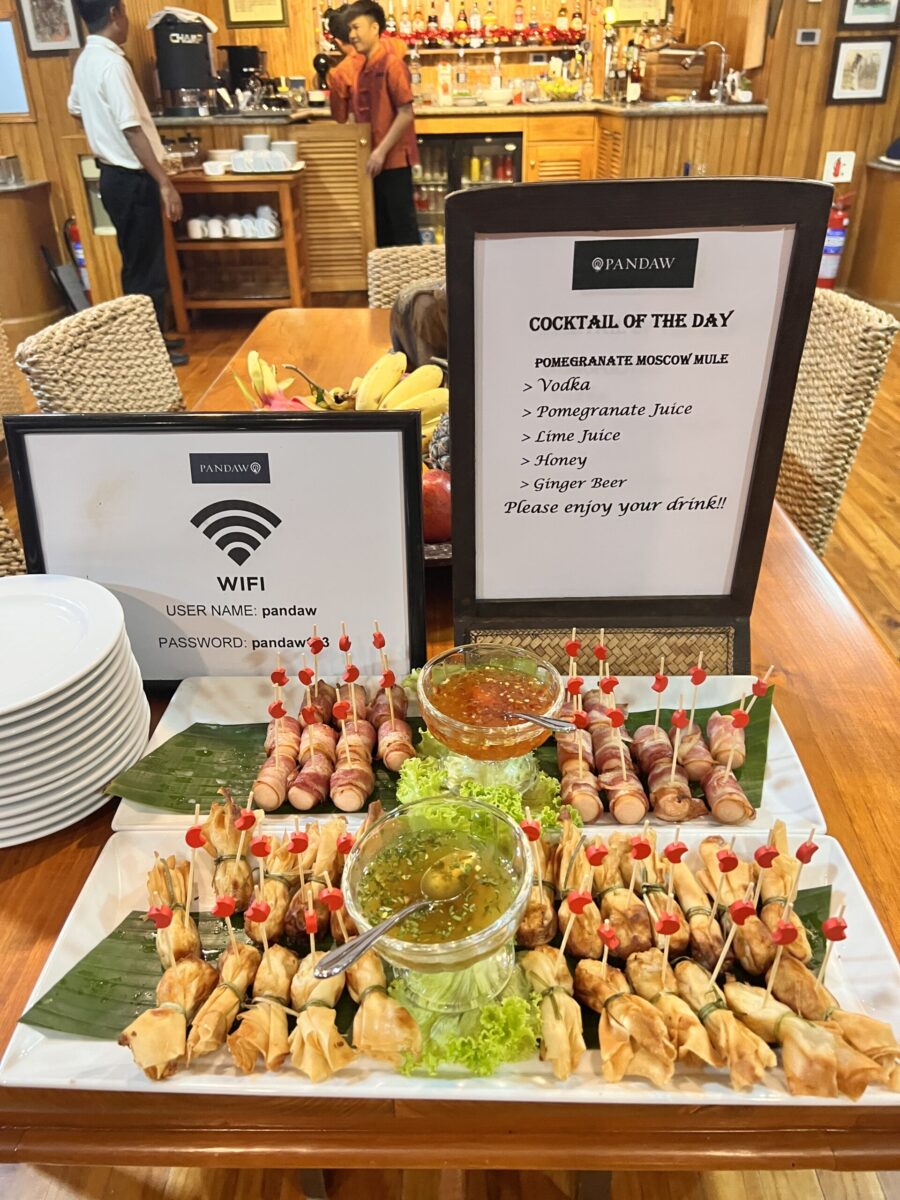
Cocktails and hors d'oeuvres are served daily in the Saloon. * Photo: Judi Cohen
Experienced Laotian Guide and Attentive Crew
For all 11 days, our resident Laotian guide, Vieng, shared information about the country, itinerary, history, customs, religion, and spiritual beliefs of the people we met during excursions. We learned about the different ethnic groups and their unique homes and practices.
The purser and crew members were as thrilled to return to cruising as the passengers were after travel was virtually shut off during the COVID-19 pandemic. Each crew member knew our names and preferences and looked after our every need on the boat.
Crew members escorting excursions carried first aid kits and were always on hand to assist passengers while crossing the rocky or sandy beaches and climbing hills and steps to visit small villages.
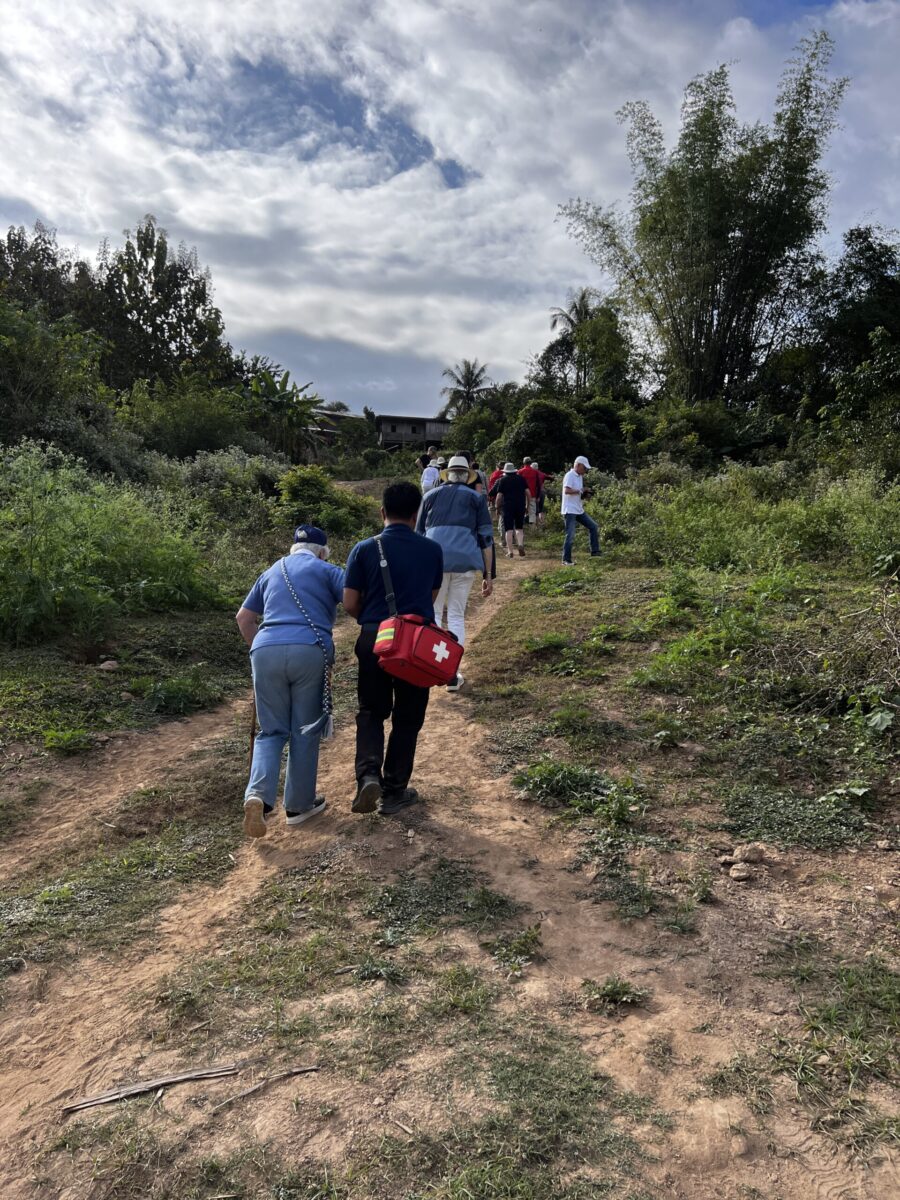
Pandaw crew carrying first aid bag and assisting a passenger up the hill into a village. * Photo: Judi Cohen
Even passengers in their late 70s with canes and walking poles were able to do the excursions with minimal assistance.
VIDEO: Below, Judi shows us a typical landing, when passengers would have to walk up and down the river banks for excursions.
Our Upper Mekong Cruise Route
Expect changes and go with the flow!
Our route remained largely as planned although the water level in the Mekong was very low near Vientiane.
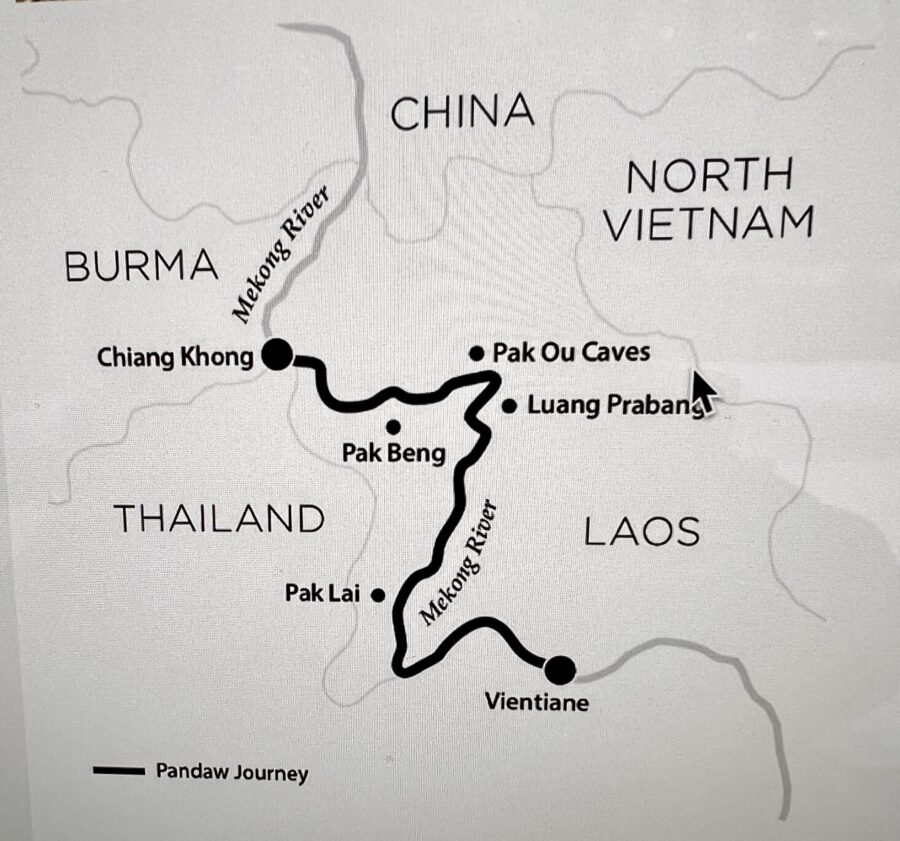
The route map. * Image: Pandaw Cruises
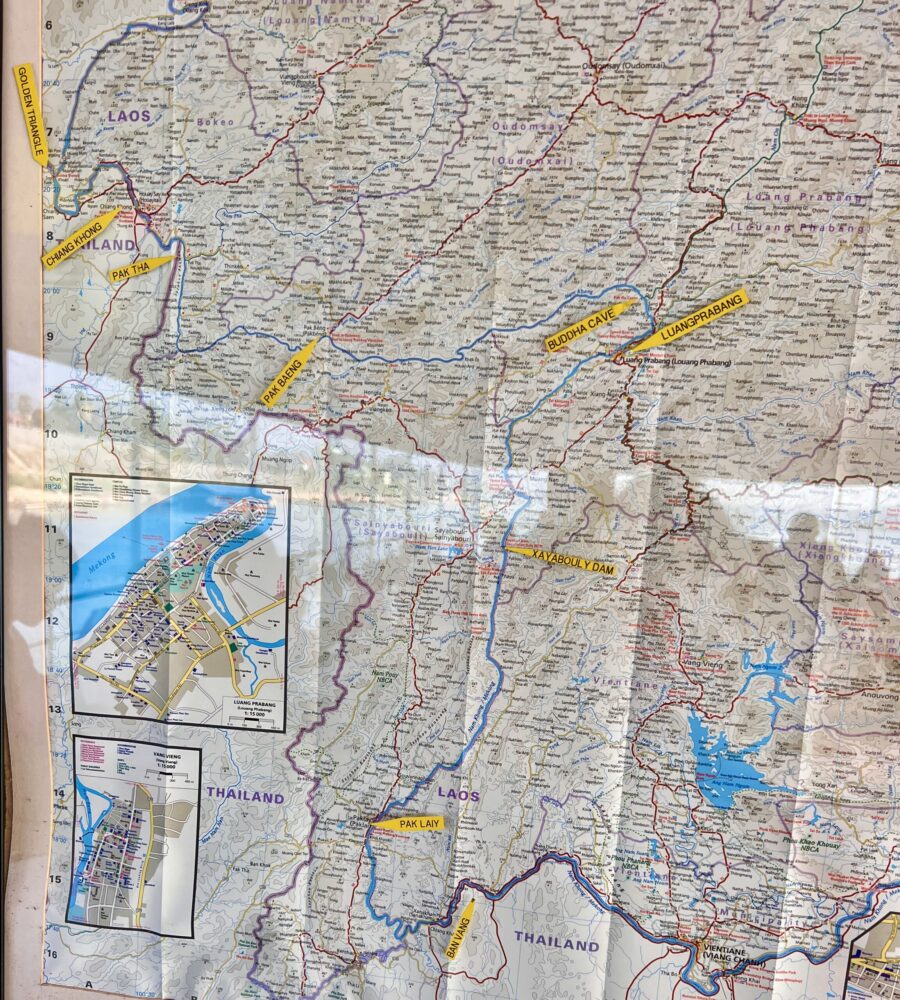
Map on board of our route upstream from Vientiane Laos to Chiang Khongk Thailand. * Photo: Pandaw Cruises
As with other small-ship expeditions, we have come to expect and embrace changes to our daily routine and route based on river conditions and weather. Morning mist delayed our planned sail aways on some days, yet I enjoyed the eerie and mysterious mood it created.
While our captain was skilled at reading the water, he needed to be able to see it to avoid rocks and sandbank, which led to a few delays.
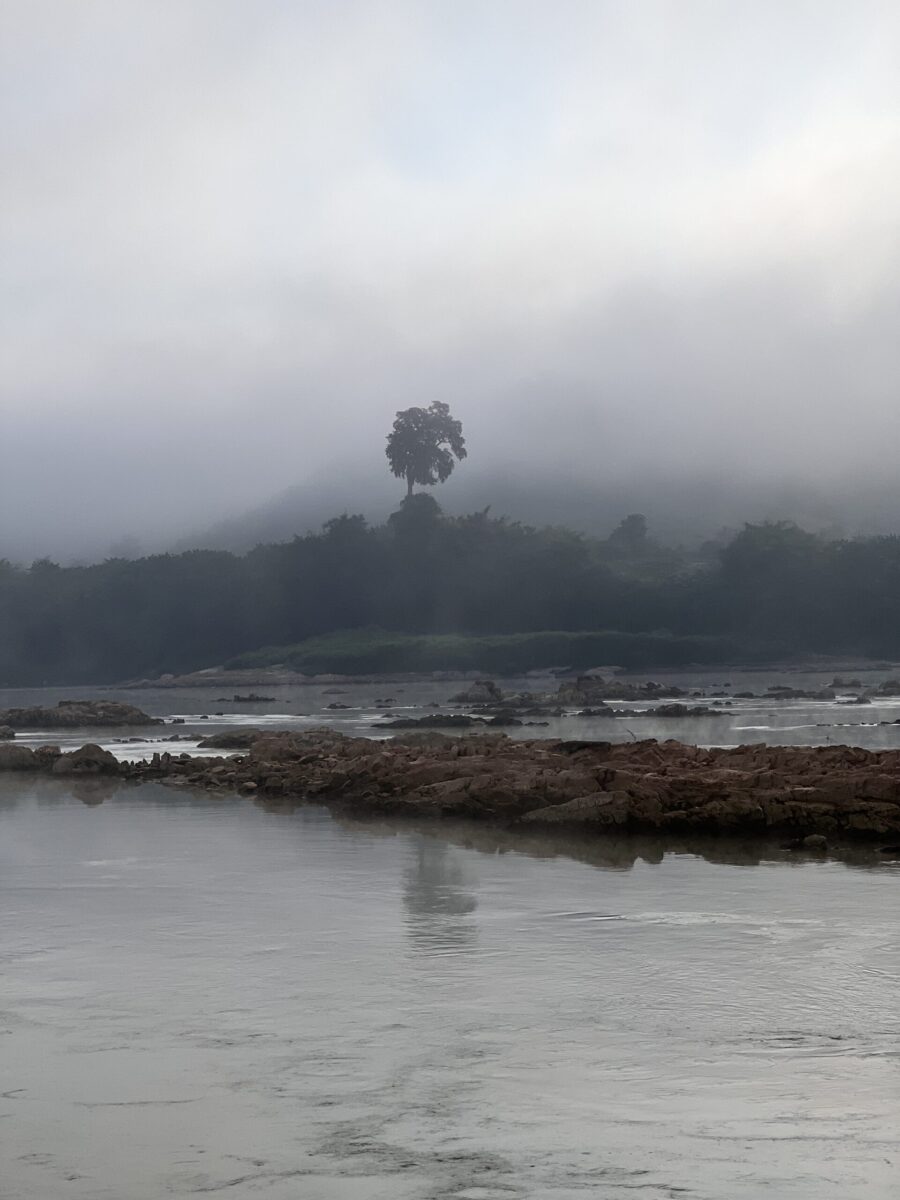
Eerie mood created as the morning mist lifts. * Photo: Judi Cohen
Champa Pandaw Cruise Tips
- Upper deck cabins have better Wifi connection than lower deck cabins.
- There is no elevator, so all passengers should be able to climb one flight of stairs and be able to walk on uneven, sandy, or rocky landing areas.
- Choose a cabin closer to the bow, away from the engine noise.
- Packing: Casual clothing can be worn all the time, and laundry service is available at a reasonable cost. If you are a member of the Pandaw club? You receive $50 laundry during the cruise. We took one small carry-on suitcase each and had ample clothing for our 20-day total trip.
- If time and budget permit book the pre and/or post extensions with Pandaw Cruises in Laos and Thailand.
- Bring a pair of sturdy walking shoes, sunscreen, and a wide-brim hat.
Highlights Of Our Laos Mekong Cruise
Boarding in Vientiane
First day and first change! Prior to the cruise, Pandaw advised us that due to low water levels around Vientiane we would need to stay in a hotel in Vientiane the first night rather than on the boat.
Fortunately, we did not miss any portion of the itinerary, and to be honest, the 2-hour bus ride followed by a 6-hour long tail boat ride to the Champa Pandaw upstream from Vientiane at Pak Lay was an enjoyable experience.
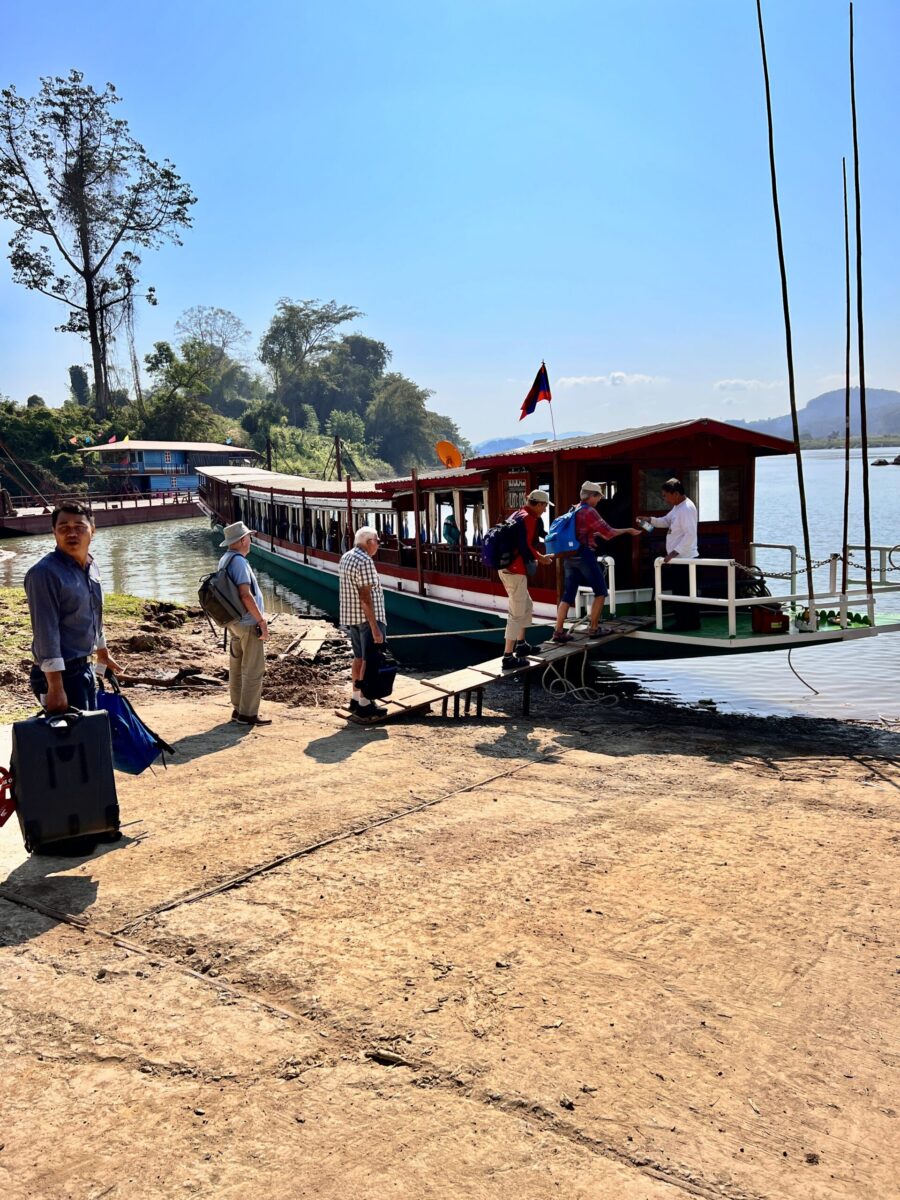
Boarding a long tail boat to take us upstream to meet the Champa Pandaw in deeper waters. * Photo: Judi Cohen
Once checked in to the SureStay Best Western hotel that was selected by Pandaw Cruises, we did a city tour exploring the major temples and historic sites.
Vientiane became the capital of Laos in 1953 and the majority of its one million residents are Buddhist. While there are over 100 temples in Vientiane, the Sisaket Museum and Temple, constructed in 1818 is the only temple that survived after the city was burned down in 1828. Over 10,000 Buddhas made of bronze and cement can be found in this temple.
We also went to the golden Pha That Luang stupa, dating back to the 3rd century AD (rebuilt in the 1930s) and regarded as the most important national monument in Laos.
At sunset, we arrived at the Patuxai Victory Gate, a 7-story arch with carved walls and ceilings and paintings of gods and elephants. It reminded me of the Arc de Triomphe in Paris. Women dressed in colourful traditional clothing were visiting at the same time and were all smiles to welcome us.
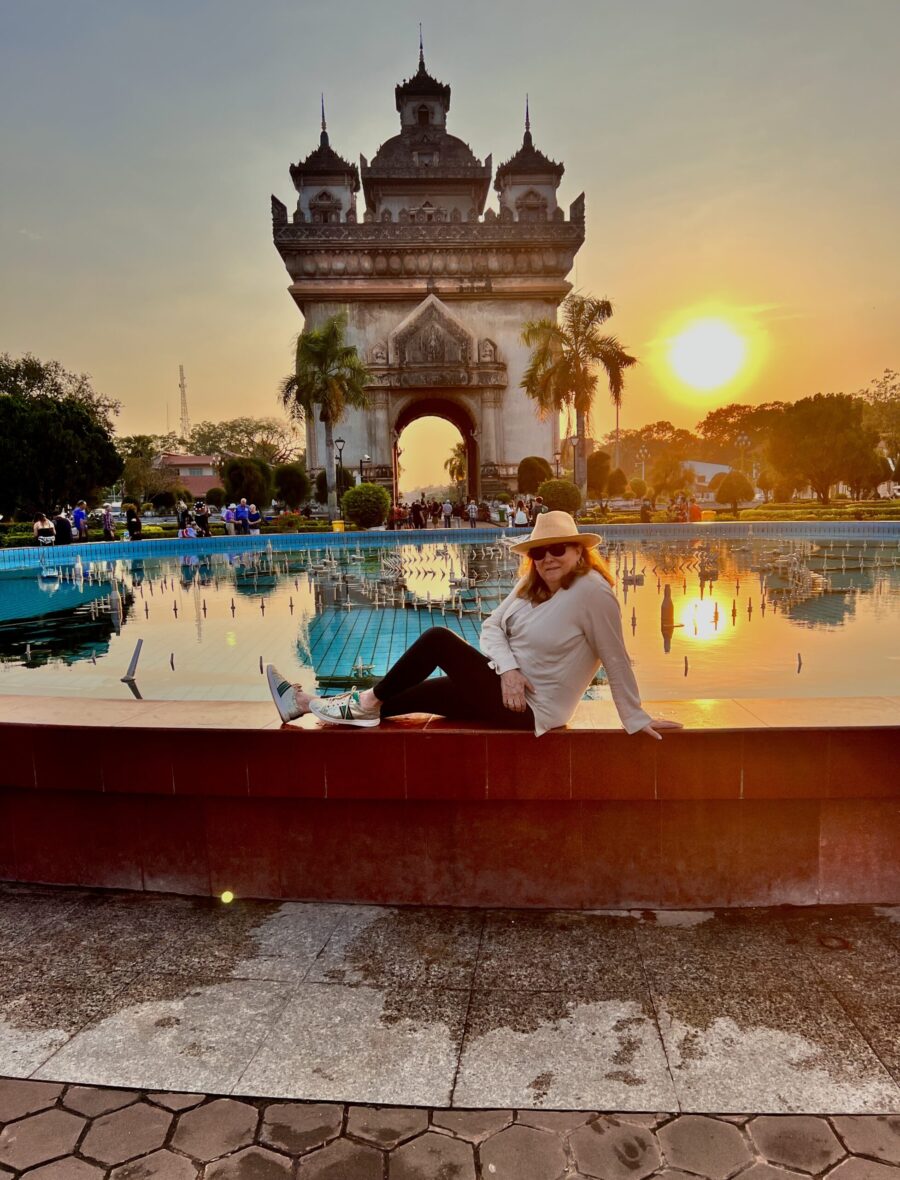
Sunset at the Patuxai Victory Gate in Vientiane. * Photo: Judi Cohen
A bustling night market, selling shoes, clothing and all sorts of everyday pharmacy and household products were just a few steps away from our hotel. This was a great place for last minute shopping before the cruise!
While the SureStay Best Western hotel was adequate, I would recommend a small chic boutique hotel called La Seine Hotel for stays in Vientiane.
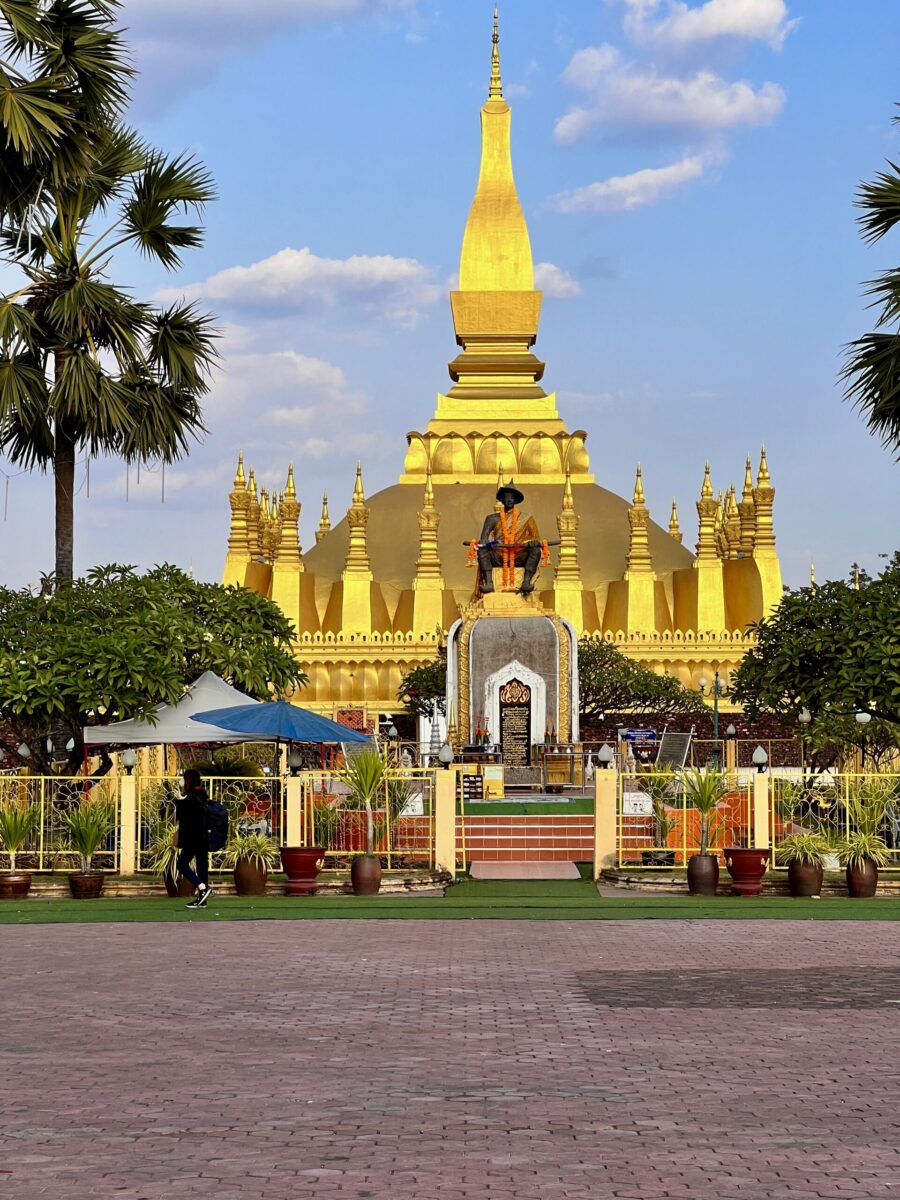
Tablet Stupa in Vientiane. * Photo: Judi Cohen
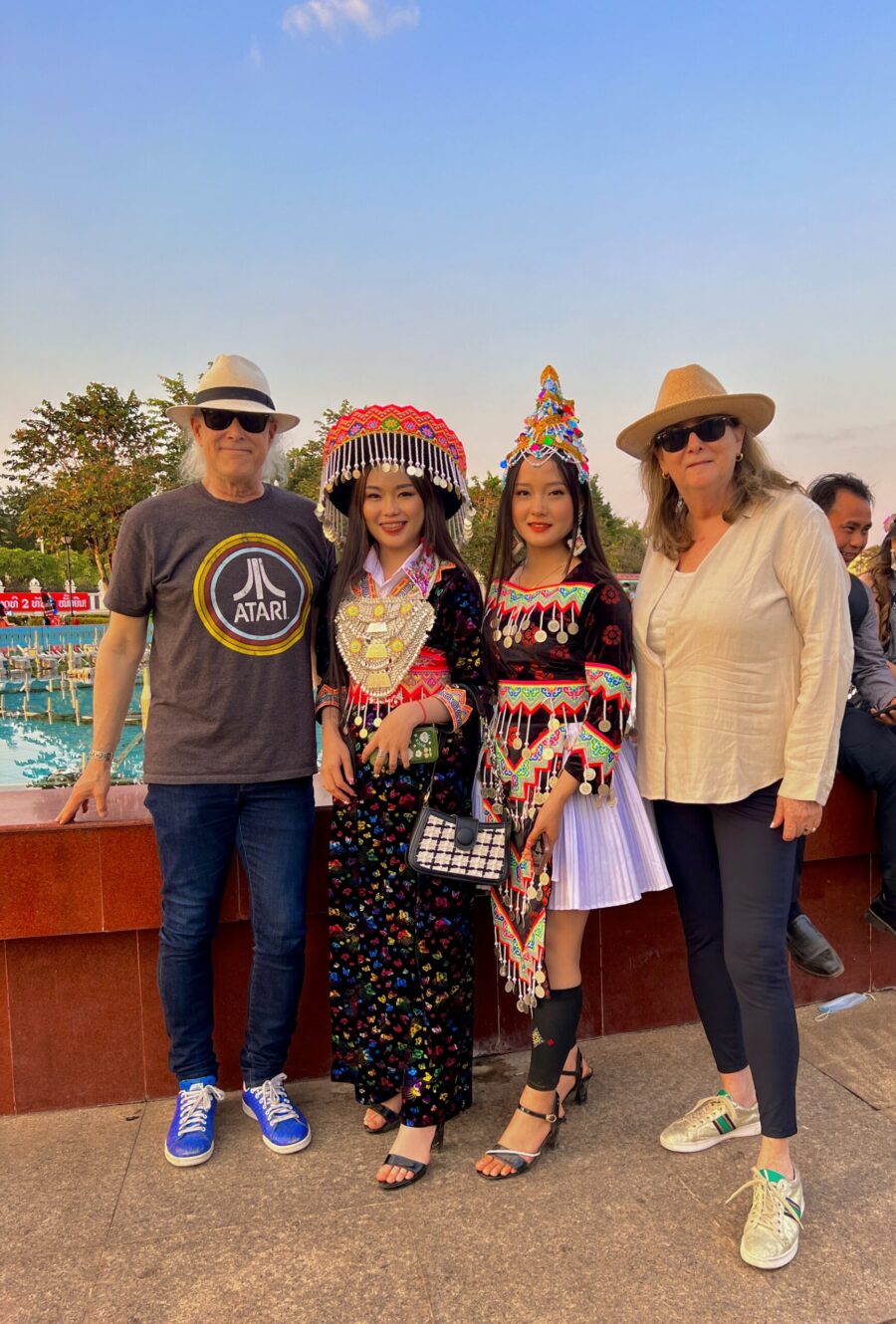
Lawrence and Judi with women in traditional festive clothing in Vientiane. * Photo: Judi Cohen
The Laotian People
Cruising slowly on the Upper Mekong, we learned about the villages that line the river and were able to visit the Khamu, Hmong, and Lowland peoples. Each village has its own unique farming and fishing practices, home design (some built of wood on stilts, while others were concrete block with tin roofs), and religious beliefs.
Curious children greeted our boat and walked with us in the dusty villages eager to speak to us and show us where they live. Teachers move from village to village with children being educated only one or two days a week and only up to grade four in many cases.
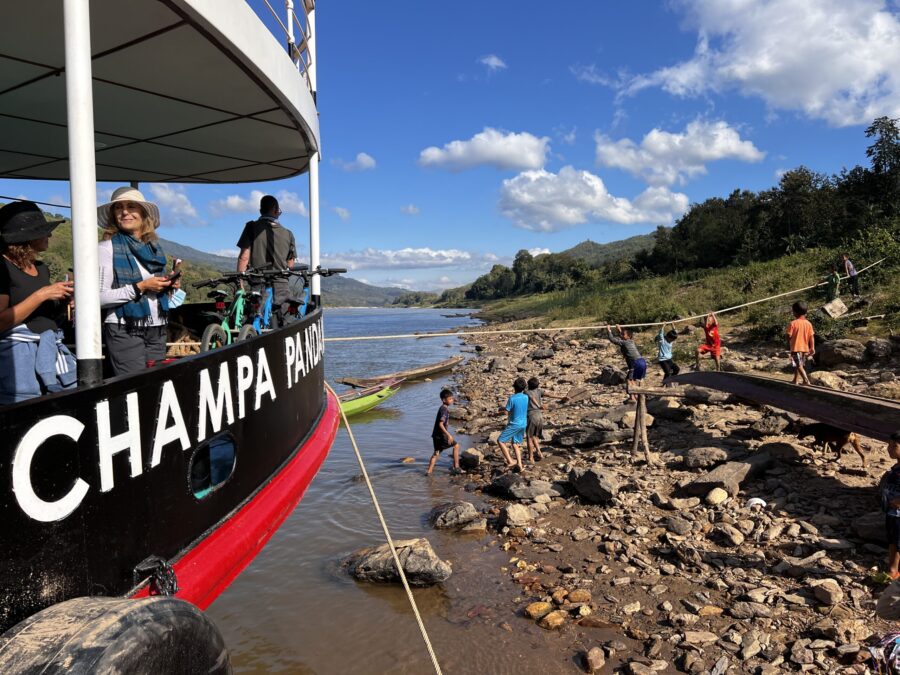
Welcomed by the children in tiny villages. * Photo: Judi Cohen
It was interesting to experience how different the countryside is from the Laotian cities like Vientiane and Luang Prabang. The villages were isolated with hardly any modern services as compared to the cities. Some villages had to relocate due to water levels rising and falling so they were rebuilt with only the essentials including housing, a store, and a school structure.
I was heartbroken to learn that there is a mortality rate of 40 percent among Laotian children, many of whom die from respiratory illnesses that require medical attention unavailable in the small villages.
During the winter season, people burn fires inside their homes for heat without sufficient ventilation.
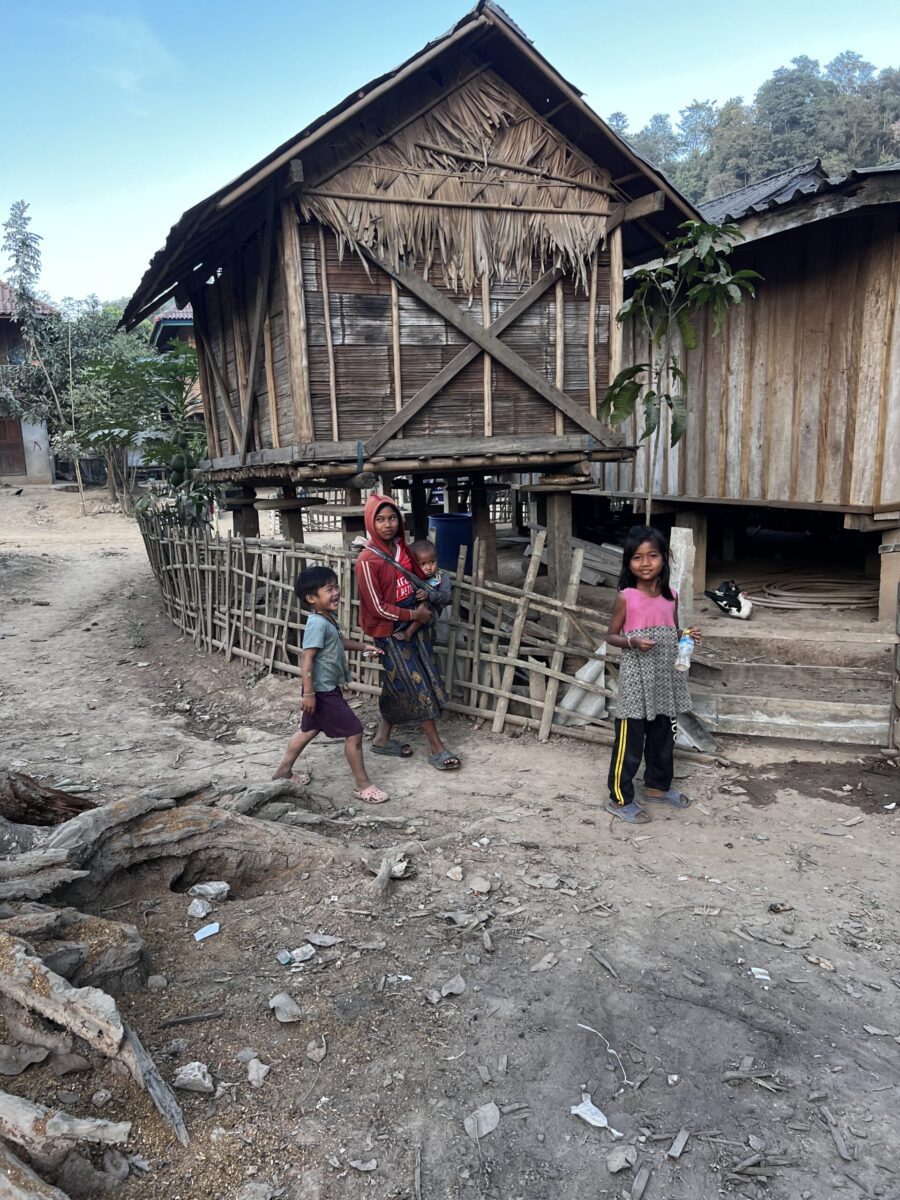
Children in the village. * Photo: Judi Cohen
The Xayaburi Dam
The first of several hydro-electric dams being constructed on the Loas section of the Mekong, the Xayaburi Dam was built in 2019 and financed by Thai companies. Most of the electricity goes to Thailand, with the residents of Laos receiving little benefit from these dams even though entire villages must be disrupted and relocated to higher land as water levels change with the operation of the dams.
Further up the river, construction had begun on one of the next of five dams in Laos.
The Champa Pandaw brushed up against the concrete walls of the narrow lock and it was such a tight fit we were able to reach out and touch the walls ourselves. The grandiose Xayaburi Dam seemed like such an odd site in an otherwise undeveloped portion of the Mekong.
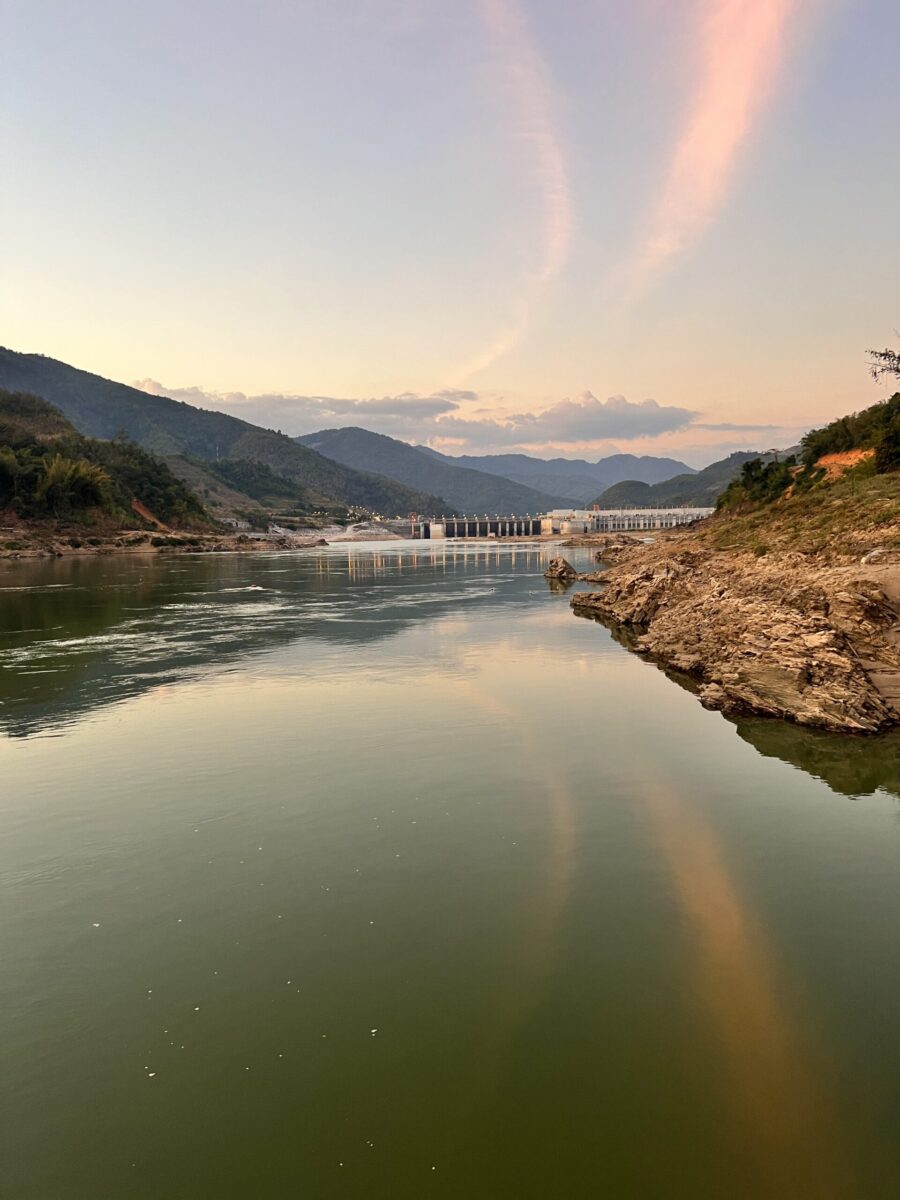
Approaching the Xayaburi Dam just after sunrise. * Photo: Judi Cohen
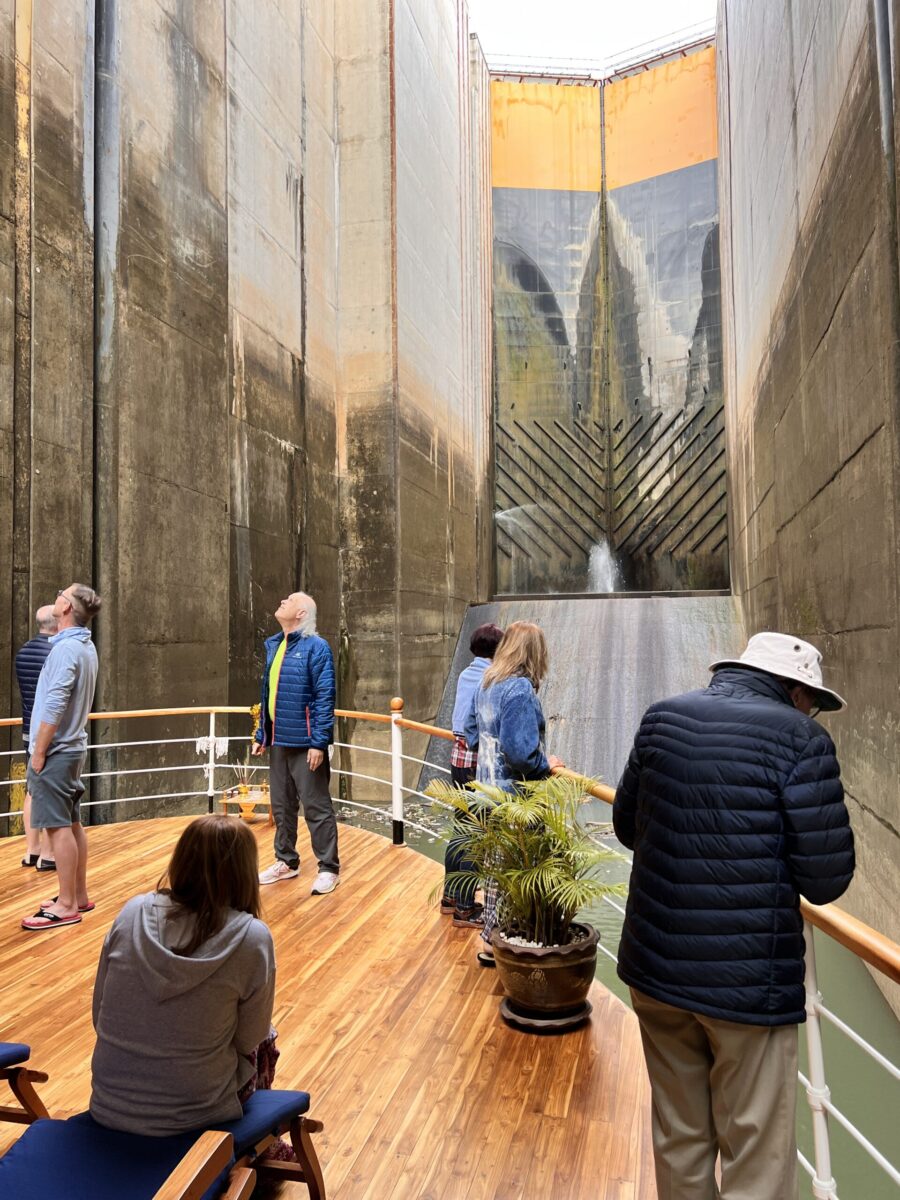
Watching the Champa Pandaw as it rises in the lock chamber at the Xayaburi Dam. * Photo: Judi Cohen
The Champa Pandaw in Luang Prabang
Arriving in Luang Prabang, a town with markets, shops, cafes, restaurants, and hotels was a big change from the small, isolated villages during our slow cruise.
The entire town of Luang Prabang is designated a UNESCO World Heritage Site and was the former capital of Laos. It’s a perfectly walkable town with numerous monasteries and many monks in their saffron-colored robes.
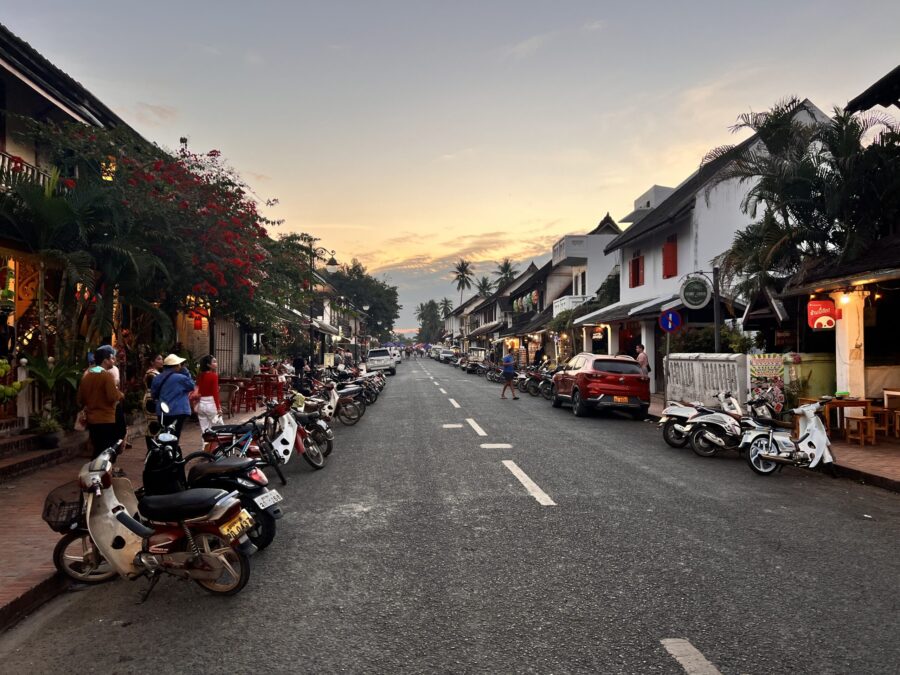
Early morning street view in Luang Prabang. * Photo: Judi Cohen
At 4:30am a small group of passengers walked with our guide in the dark to the city center to give alms to the monks parading along the streets where people were seated on small stools to put sticky rice in the monk’s tins.
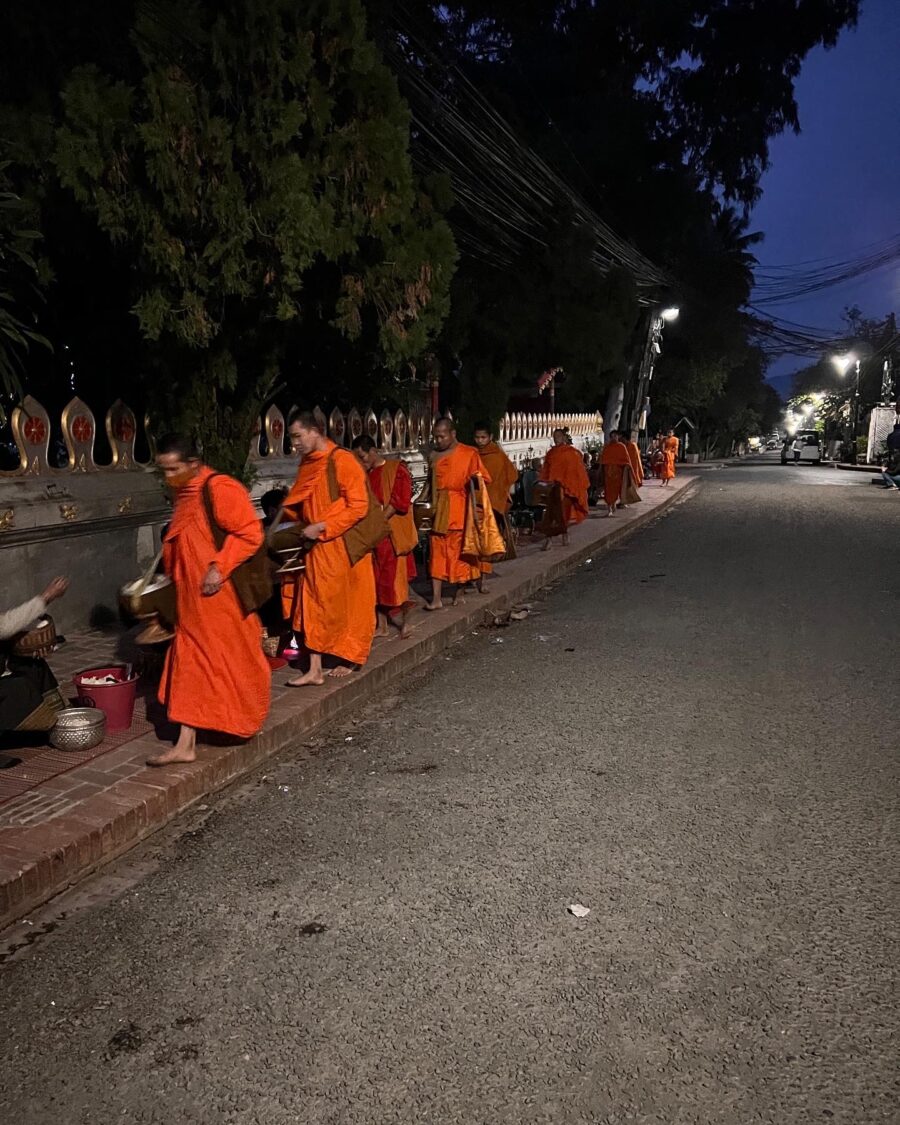
Giving alms in Luang Prabang. * Photo: Judi Cohen
By sunrise, we made our way to the busy morning market with vendors selling fresh meat, riverweed, fried rats and bats, and all varieties of seafood.
Returning to the boat for breakfast, we shared our stories with the other passengers who chose to get their beauty sleep rather than wake up early for sightseeing.
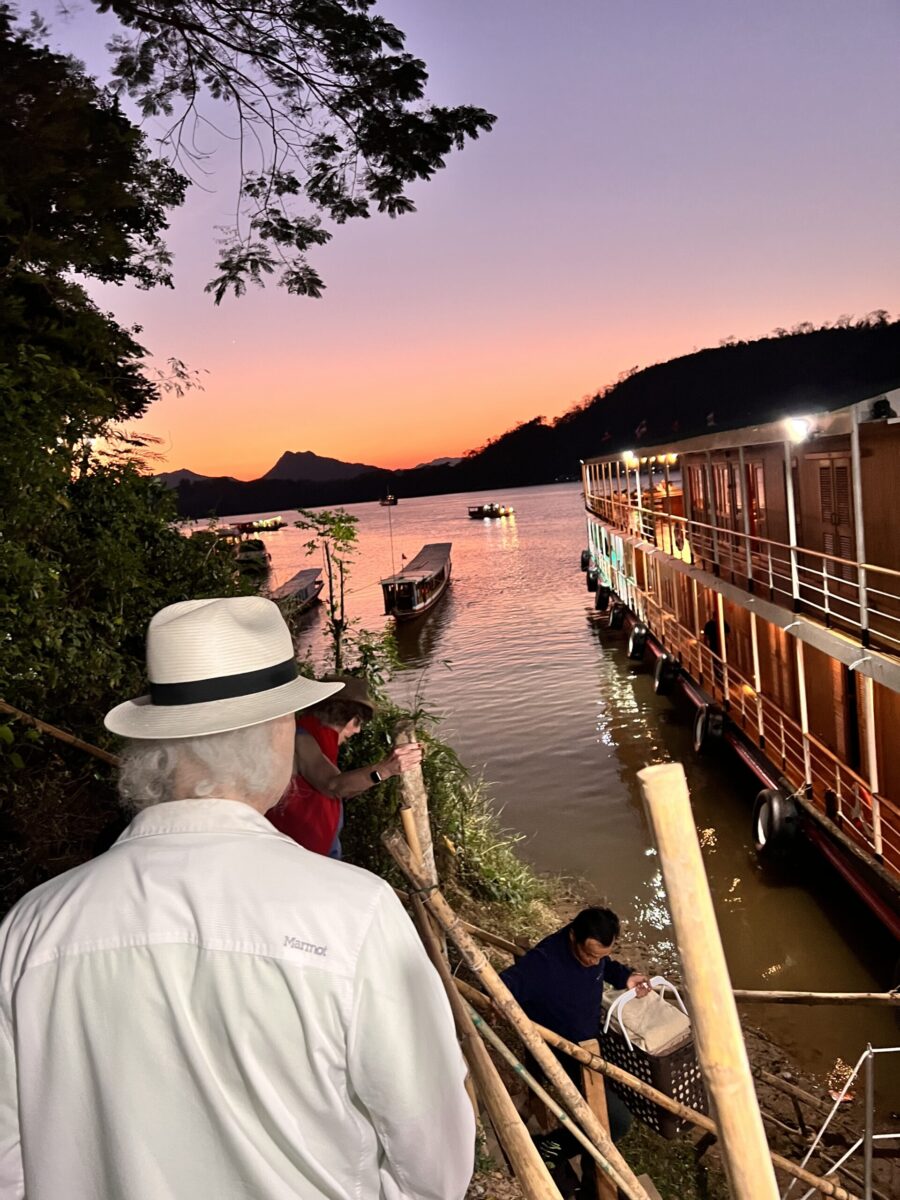
Climbing down the make-shift stairs in Luang Prabang to the boat. * Photo: Judi Cohen
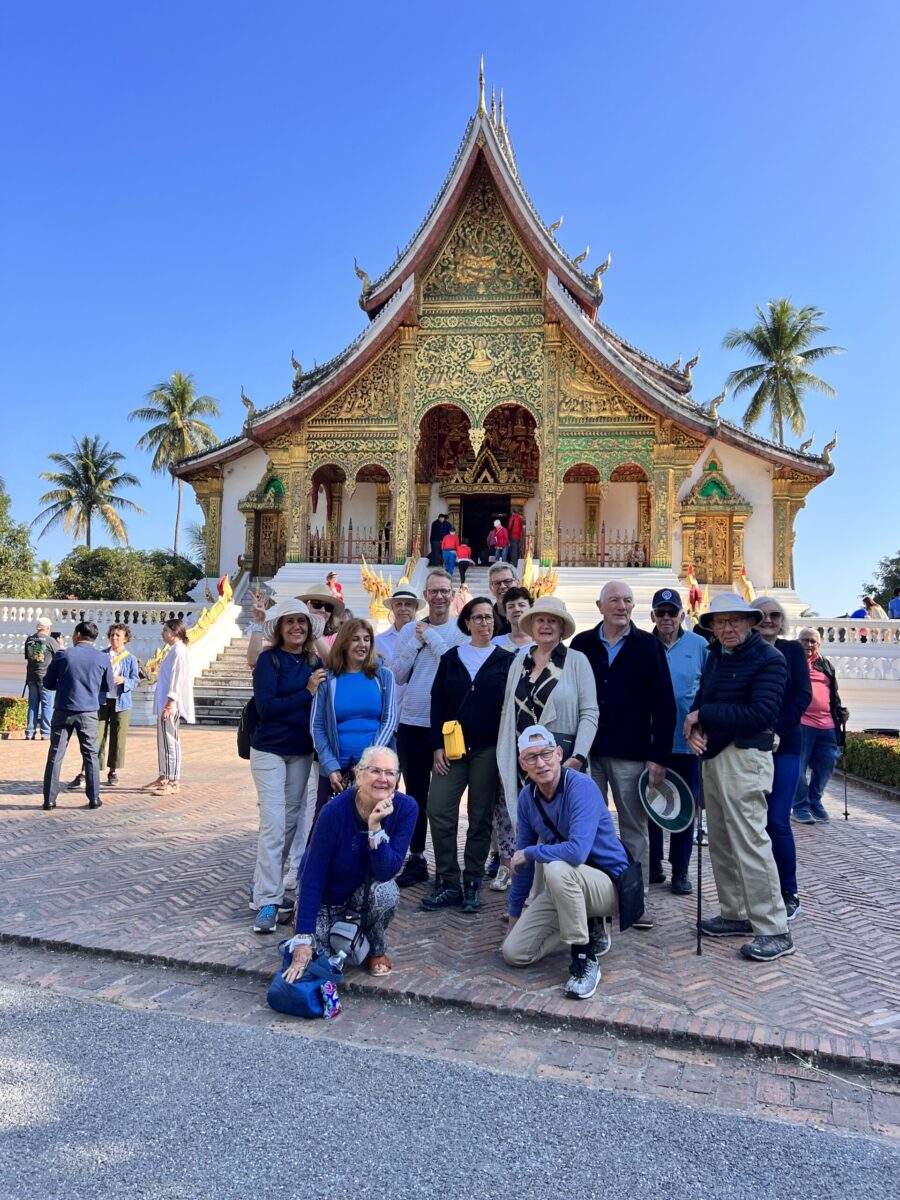
Passengers visiting the Sisaket Temple in Vientiane. * Photo: Judi Cohen
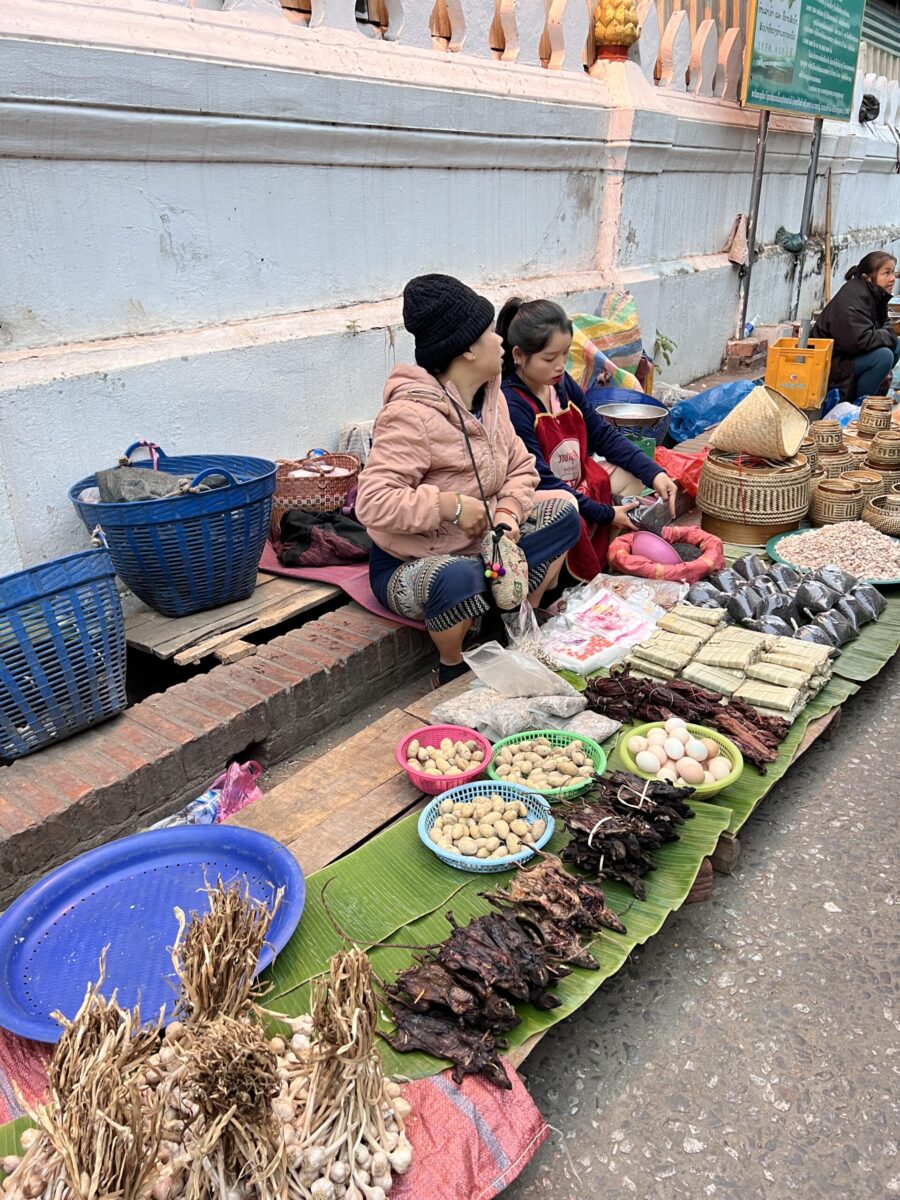
Morning Market in Luang Prabang. * Photo: Judi Cohen
Visits to Jungle Kuang Si Waterfall, Muang Khay Village Buffalo Farm, and Kuang Si Bear Rescue Centre
Following a short drive from Luang Prabang, Pandaw arranged a full afternoon of sightseeing that included a walk at the Jungle Kuang Si Waterfall. Unlike Niagara Falls or Victoria Falls, the water flowed over multi-level rock outcroppings creating shallow pools, perfect for swimming.
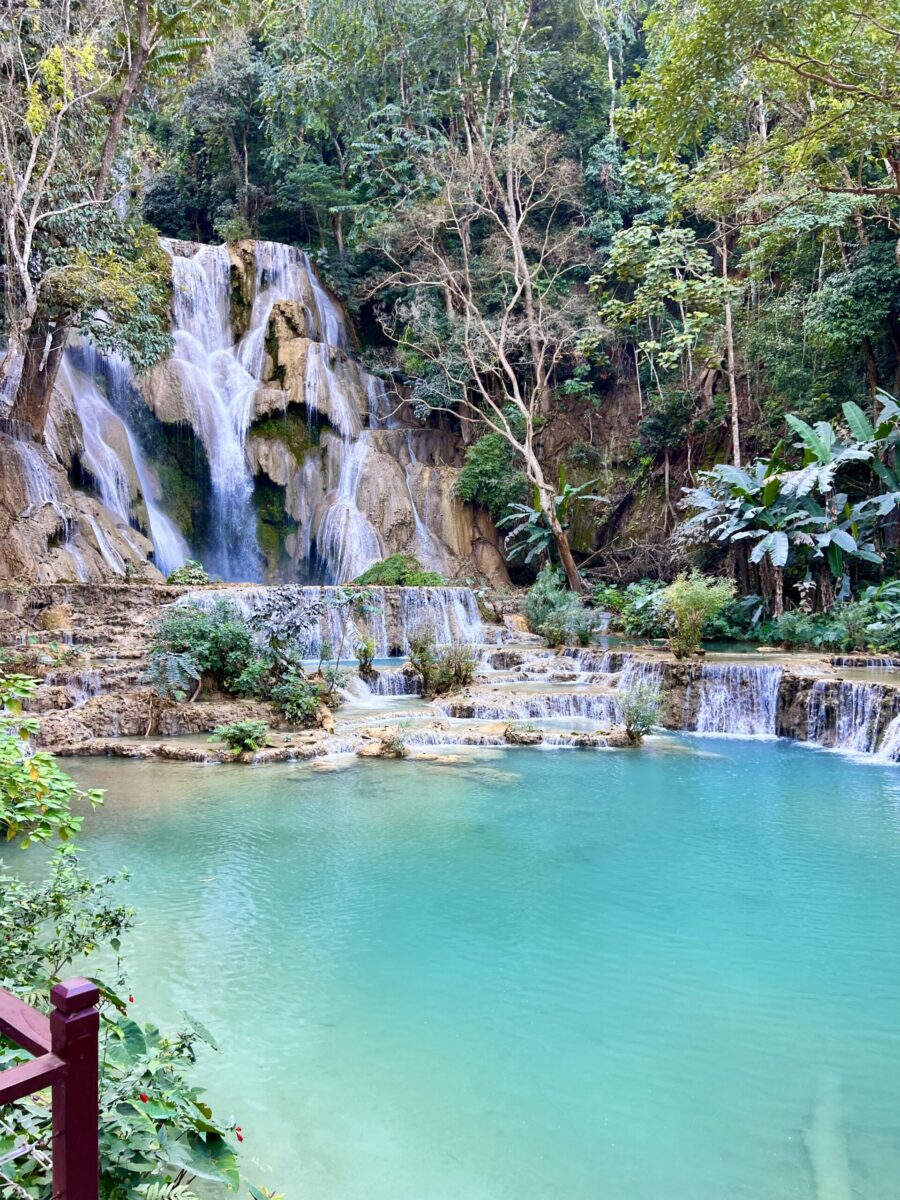
Jungle Kurang Si Waterfall. * Photo: Judi Cohen
As we walked back to the parking area, we watched playful Asian moon bears in the Kuang Si Bear Rescue Center. The bears were rescued from poachers, and they cannot be returned to the wild as they will be hunted again.
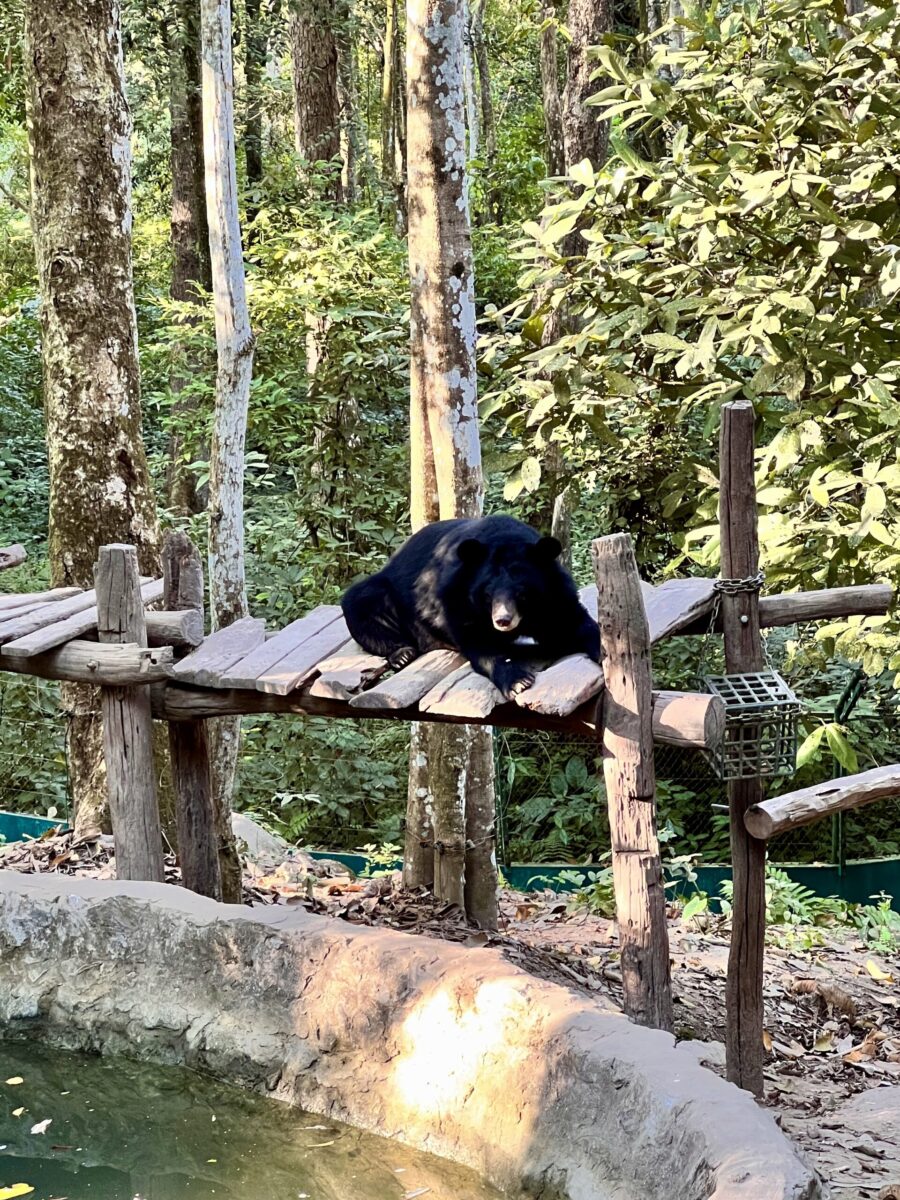
Asian black relaxing in the Bear Rescue Center. * Photo: Judi Cohen.
My favorite stop was at the Muang Khay Village Buffalo Farm where we learned about buffalo milk and cheese production, which is new in Laos. Feeding the buffalos from large bottles was a blast.
We wanted to buy some buffalo mozzarella cheese to make caprese salads on the boat, however their entire stock was committed to restaurants in Luang Prabang.
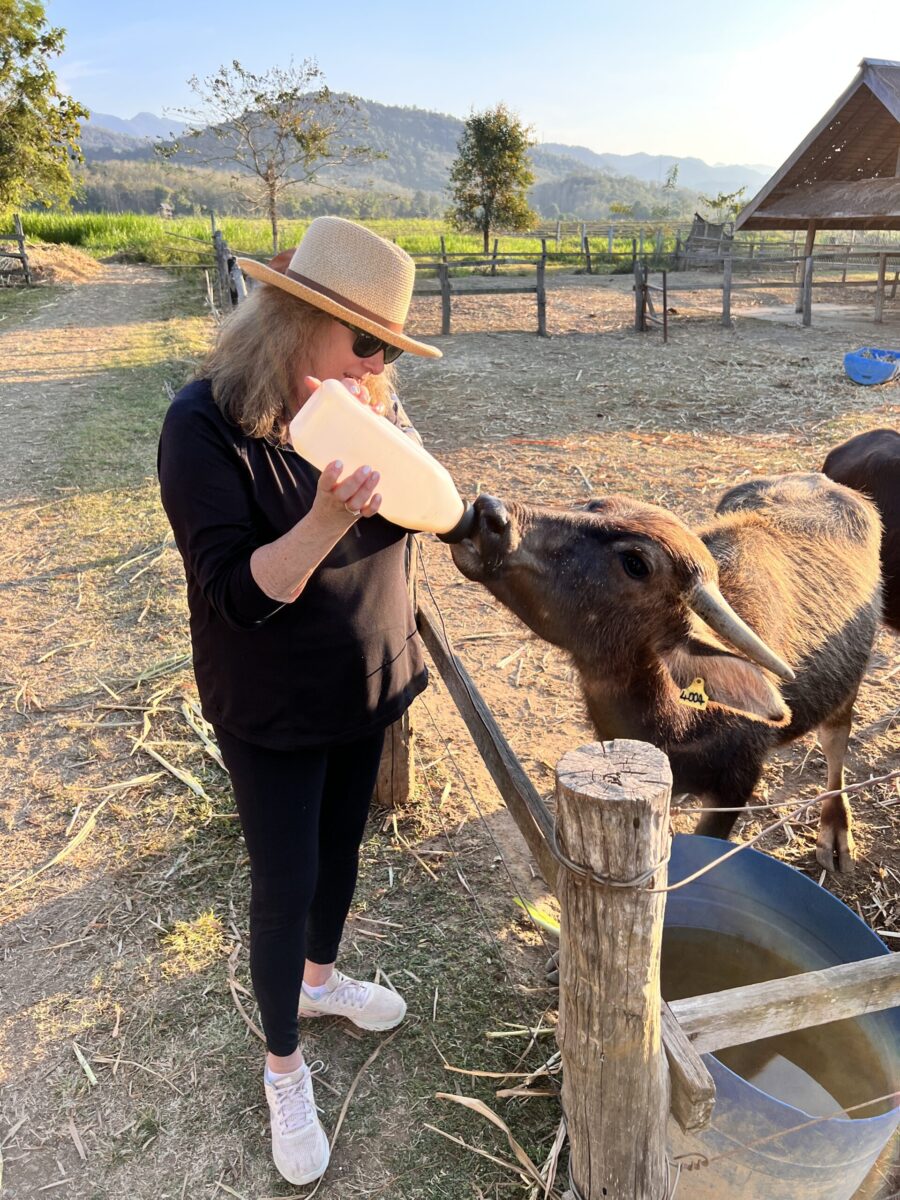
Judi feeding milk to a buffalo at the Laos Dairy Farm on the outskirts of Luang Prabang. * Photo: Lawrence Cohen
BBQ Dinner and Party on a Sandbank
One night the boat nuzzled up close to a deserted sandbank and the crew tied the boat up to trees for an overnight stay. Tables, chairs, barbecues, and drums were carried off the ship. Seating was arranged in a large semi-circle around a blazing bonfire.
Pandaw created a memorable and romantic evening in the middle of nowhere! We enjoyed cocktails and beverages along with a delicious array of BBQ pork, beef, chicken, many fresh salads, and vegetables.
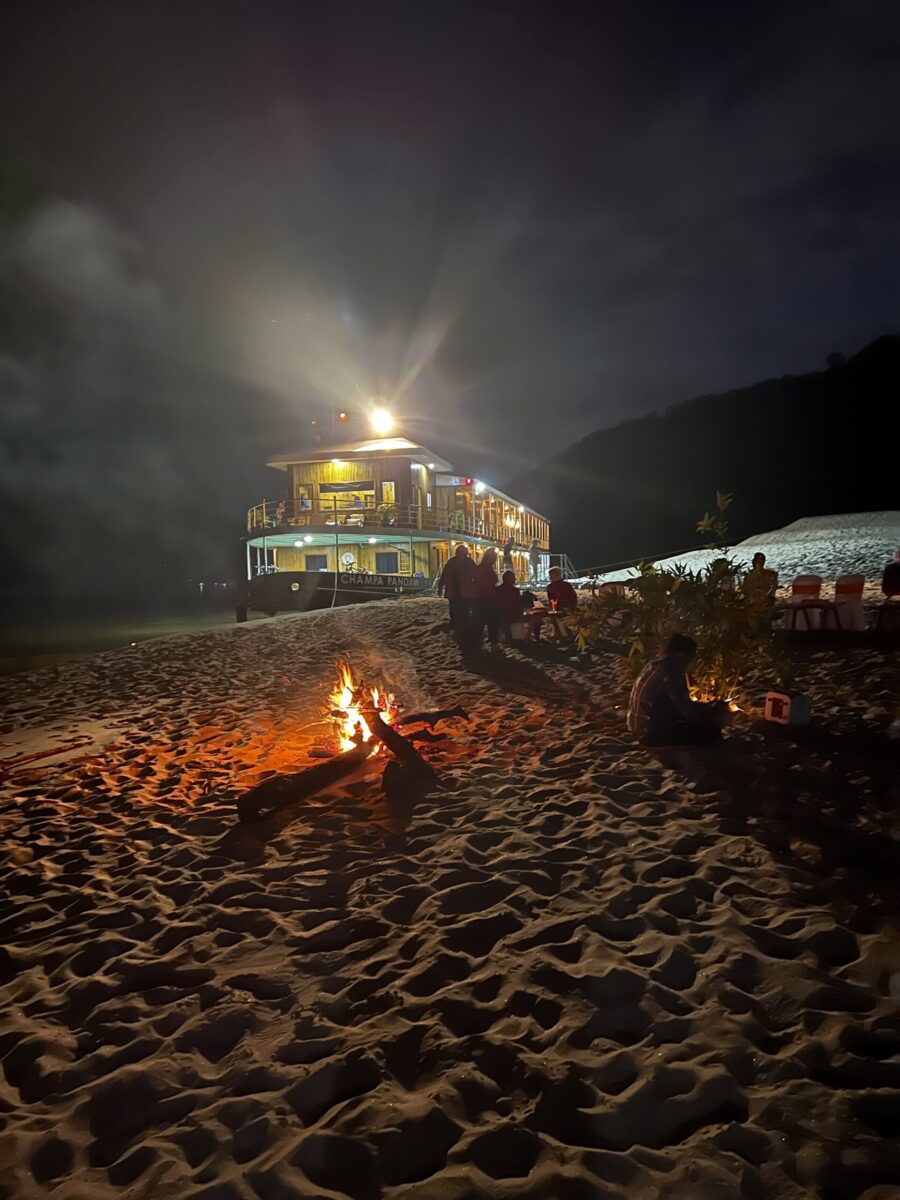
Fire continues to burn a the party on the sand dune is coming to and end with everyone returning to the Champa Pandaw. * Photo: Judi Cohen
We mingled with the crew, danced under the moonlight and at the end of the evening, we made a wish and released oil lanterns into the sky watching as they were carried across the river and off into the distance.
Emotions welled as we shared warm hugs with one another before retiring to our cabins.
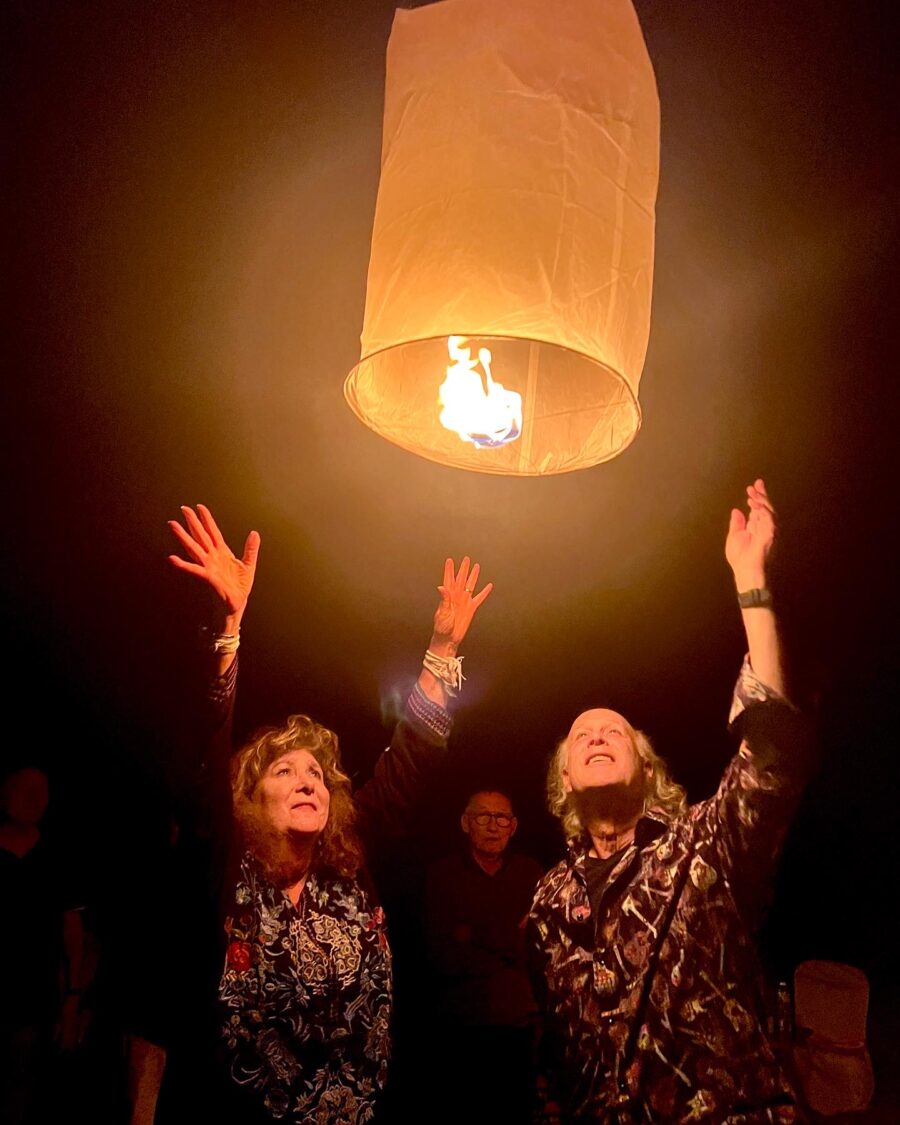
Judi and Lawrence making wishes before releasing a fire lantern at the sandbank BBQ dinner. * Photo: Judi Cohen
Enrichment & Entertainment Onboard
Cruising in Laos is slow and quiet, which means there is a lot of enrichment and entertainment that happens aboard the boat between excursion stops. Some passengers read or worked on crosswords, while others lounged comfortably on the upper deck watching the changing scenery.
I participated in the cooking demonstration, towel making, a tour of the engine room, and a Laos language class. I was able to greet people I met with “Sa Bai Dee” (hello) whenever we left the ship.
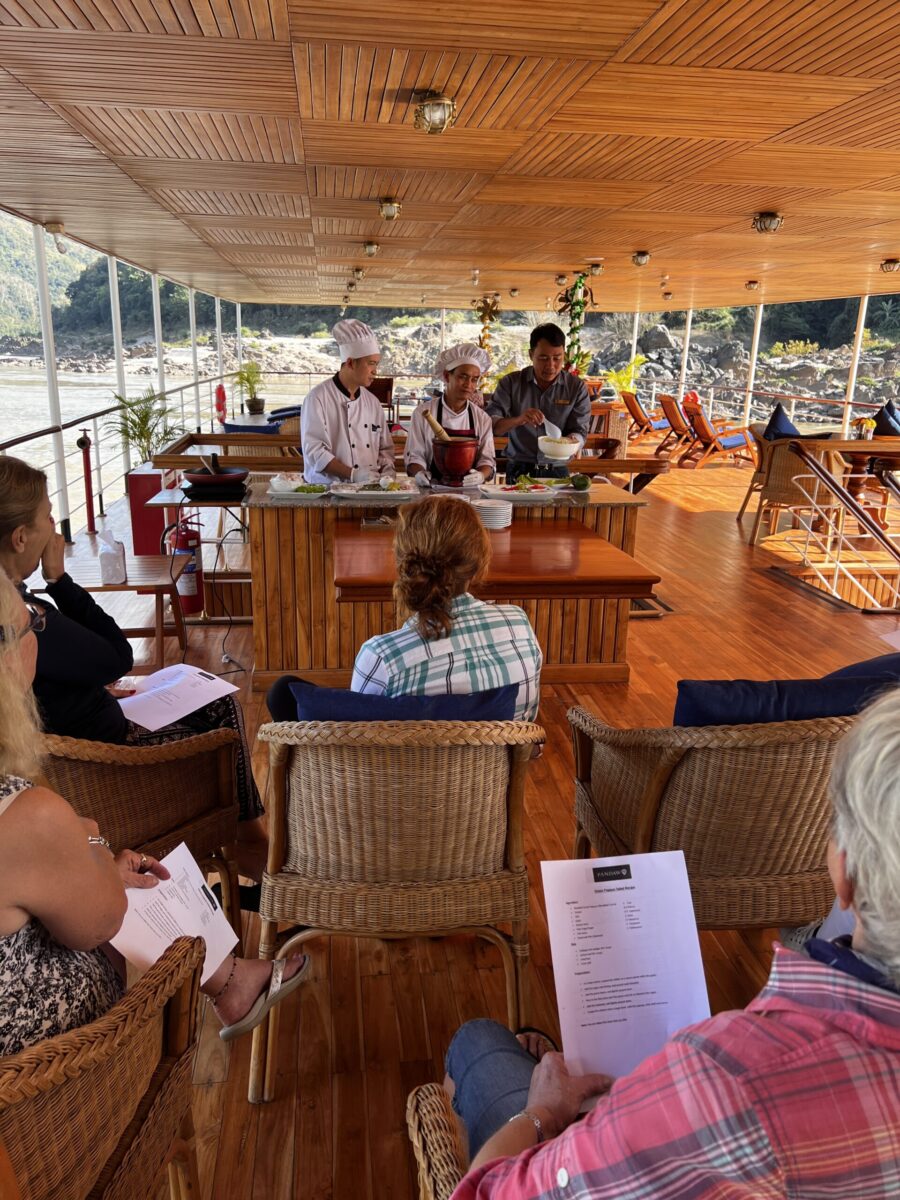
Cooking demonstration on the Champa Pandaw. * Photo: Judi Cohen
One evening, I enjoyed hot popcorn in the saloon and watched a documentary film called “Mekong River” by Sue Perkins that provided background on the history of the river and the controversial dam construction.
With daily lectures, cultural performances, a baci ceremony with Monks bestowing blessings on guests (including white strings being tied to wrists), and New Year’s Eve celebrations including dinner and a lively, loud party with singing, dancing and bottles of bubbly flowing, we were never bored.
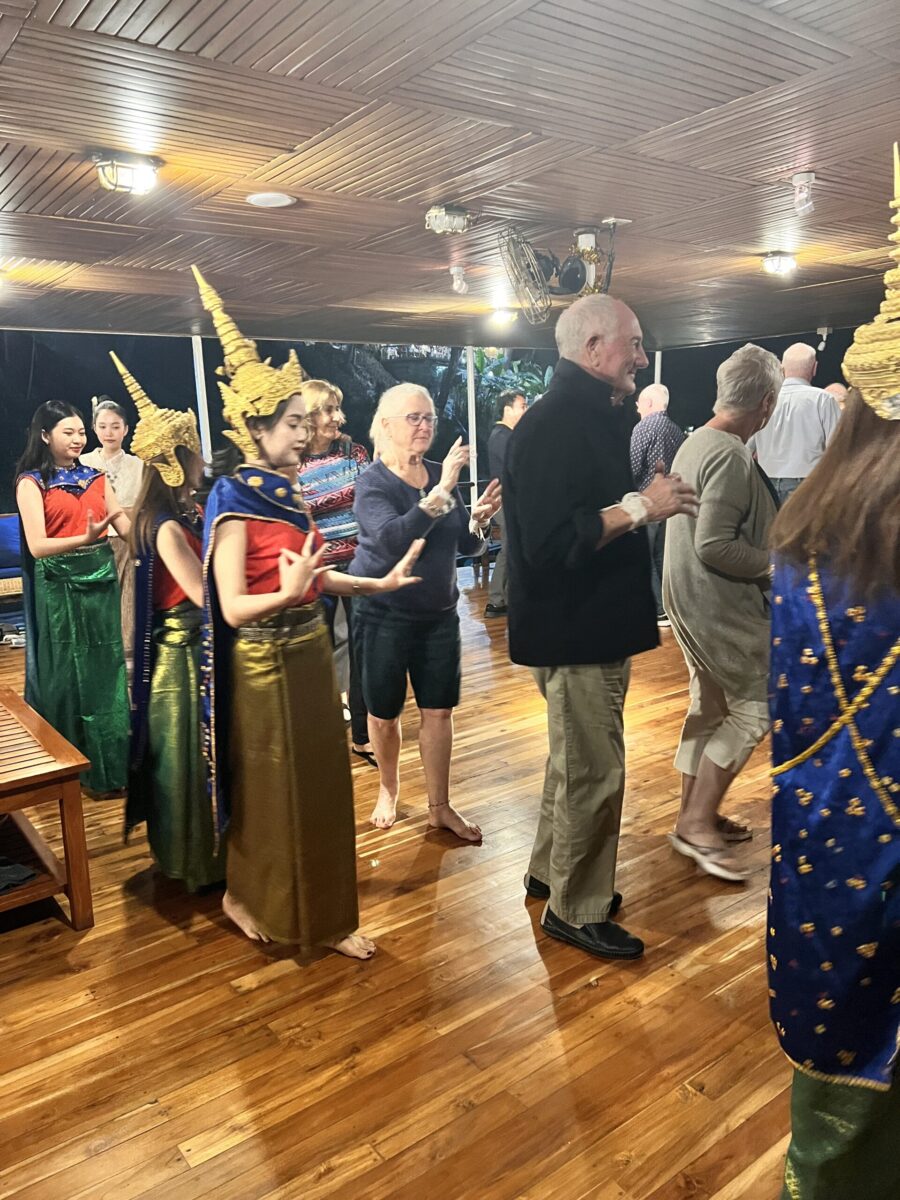
Guests join in to the traditional dance on the deck. * Photo: Judi Cohen
Cruising towards the disembarkation port in Chiang Khong, Thailand, the Champa Pandaw gracefully navigated the ever-changing Mekong River with Thailand on the left and Laos on the right.
At Huay Xai, Laos we carried our passports and departure papers across the immigration point and proceeded by bus to the Thai Friendship Bridge before meeting our boat at the Chiang Khong jetty.
Our Champa Pandaw Cruise Ends
Rising early the next morning to depart on a private transfer to Chiang Rai for our onward flight to Bangkok, we bid fond farewells to the crew and fellow passengers exchanging business cards and email addresses so we could stay in touch.
Since we had spent time in both Chiang Rai and Chiang Mai on previous trips to Thailand, we chose not to take the optional Pandaw Cruises transfer that included visits in the Golden Triangle (Chiang Rai and Chiang Mai), although I would highly recommend taking advantage of the optional extensions to stay in Thailand after the cruise if this is your first visit.
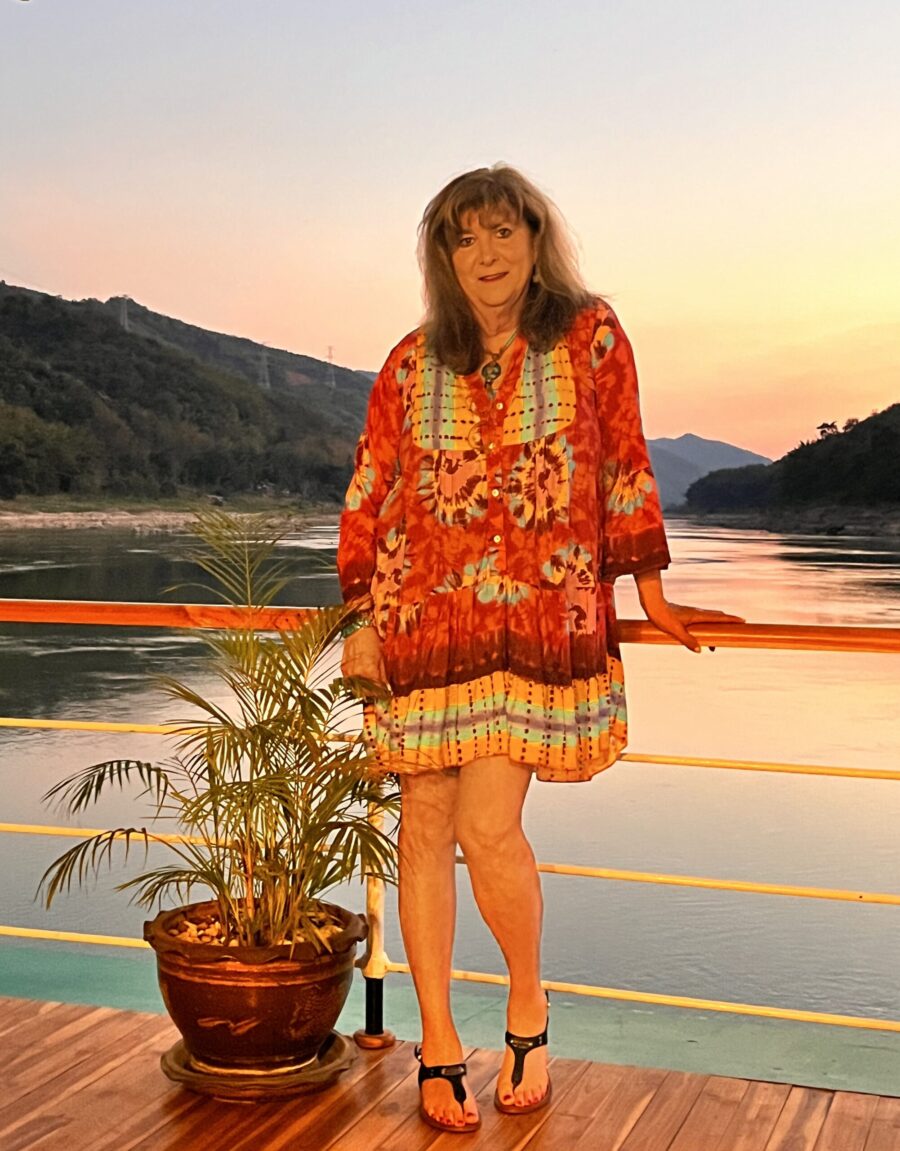
Judi on the stern with a dramatic sunset. * Photo: Judi Cohen
My Final Thoughts on Our Champa Pandaw Cruise
Pandaw has three boats operating in Laos. You can also consider a combined multi-country cruise with Pandaw.
Drifting along one of the world’s greatest rivers on a small ship is the perfect way to see the countryside and experience the Laotian people in the villages and towns along the way.
Fares for the 10-night Laos Upper Mekong river cruise start at $4,796 USD per person, including all excursions.
Getting There
Bangkok is one of the best cities to connect with other international airports. We had one full day to see some highlights in Bangkok and booked a day-hotel so that we could get some rest before our journey back to Canada.
Passengers could consider a longer stay in Bangkok before or after the cruise, as there is so much to see and do during the day at the palaces, floating markets, and at the lively night markets.
Pre & Post Travel in the Region
We stayed in Taipei for three nights on our way to Laos, followed by one night in Bangkok and then one night in Vientiane on our own before meeting our cruise group.
In Taipei we booked an amazing SLH boutique hotel, Hotel Eclat in central Taipei. We walked and toured on our own the entire time.
Then we flew to Bangkok for a one-night stay in an unmemorable hotel, before flying to Vientiane. Upon arrival in Vientiane, we spent one night pre-cruise in a small boutique hotel, La Seine with a fantastic roof top bar and restaurant. Our suite was enormous with a giant jacuzzi tub in the centre of the room.
The next day, we met up with Pandaw at another city hotel of their choosing, which was near the night market but was not great. (As mentioned above, we were supposed to start our cruise right away in Vientiane, but instead the group was put up in this city hotel for the “first night of the cruise,” so our group could then take a longtail boat the next morning to meet Champa Pandaw upstream in deeper water.)
Weather in Laos
We travelled in late December and found the nights and early mornings quite cool. Bring layers including a fleece and jacket. During the day it was warm and sunny.
Dry Season runs from October to April, and the wet season from May to October. The hottest time of the year is between March and June.
The low river levels are a chronic issue, especially around Vientiane, so be prepared to not actually board the river boat in the city itself.
![]()
Don’t miss a post about small-ship cruising, subscribe to QuirkyCruise.com for monthly updates & special offers!
© This article is protected by copyright, no part may be reproduced by any process without written permission from the author. All Rights Reserved. QuirkyCruise.com.

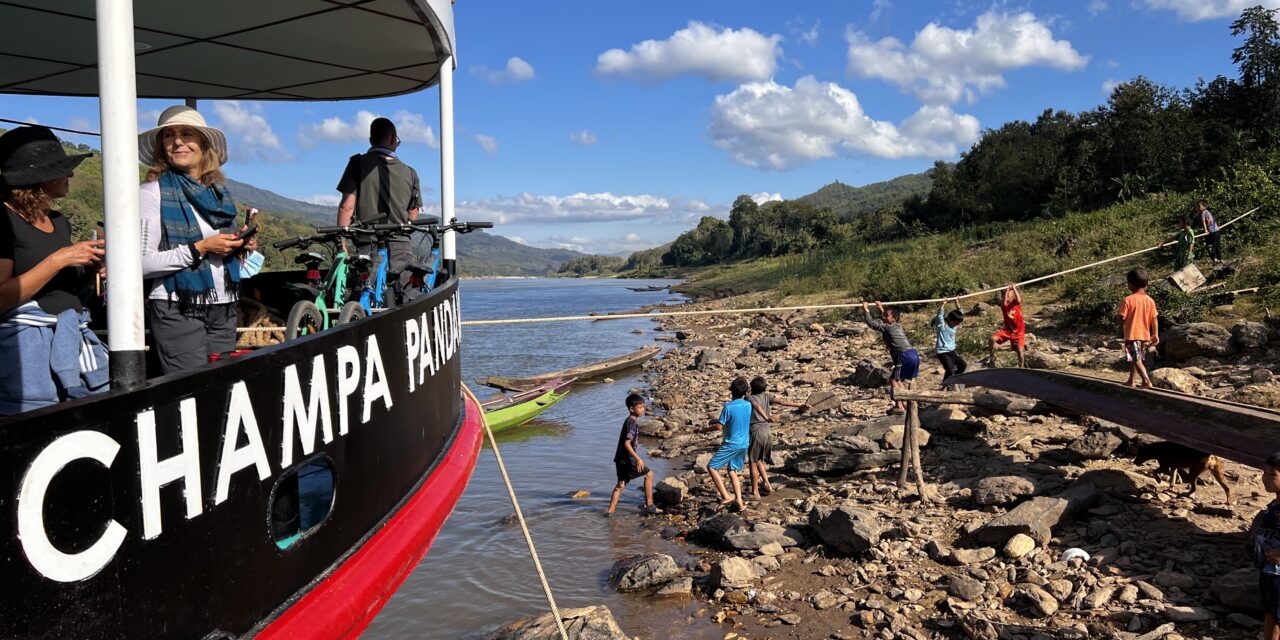
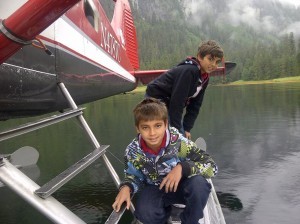
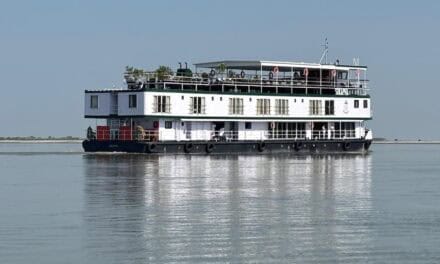
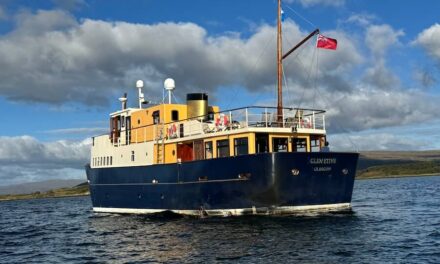
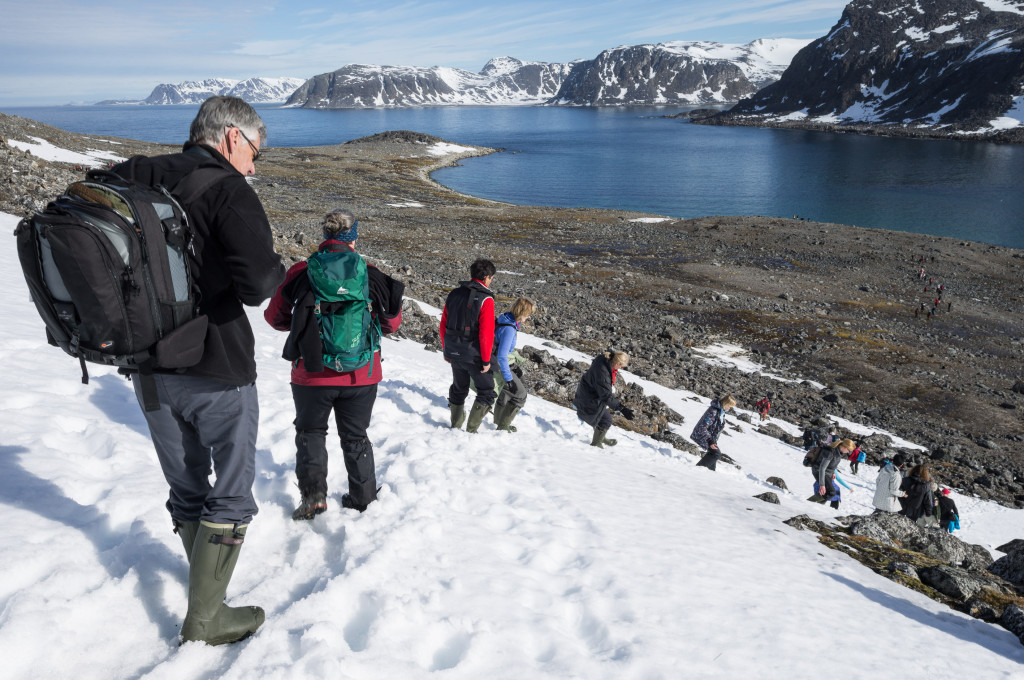

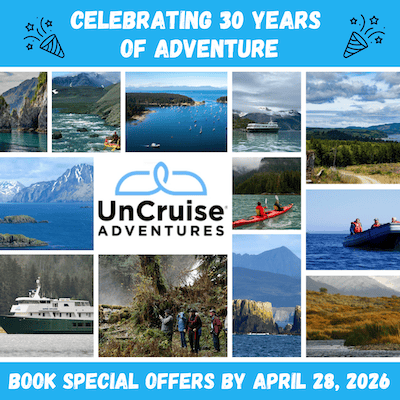
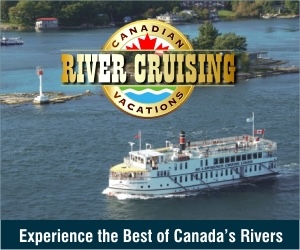





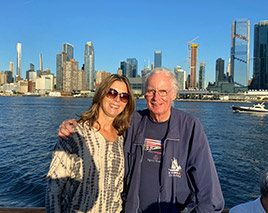 HEIDI SARNA
HEIDI SARNA
